外研版高中英语必修
- 格式:doc
- 大小:44.50 KB
- 文档页数:4
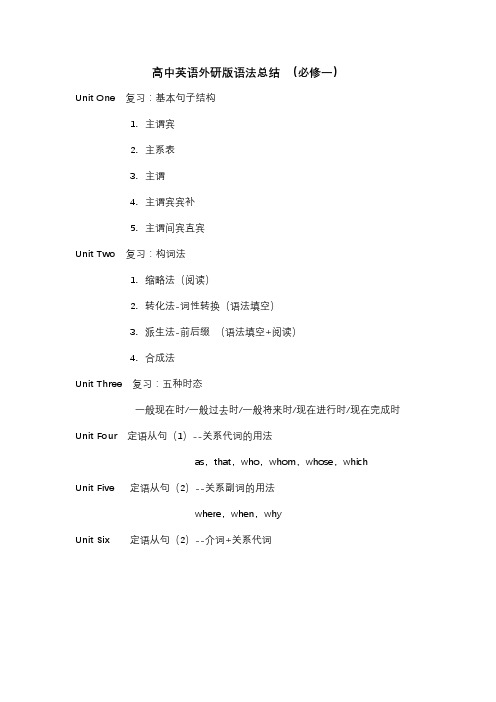
Unit One 复习:基本句子结构1.主谓宾2.主系表3.主谓4.主谓宾宾补5.主谓间宾直宾Unit Two 复习:构词法1.缩略法(阅读)2.转化法-词性转换(语法填空)3.派生法-前后缀(语法填空+阅读)4.合成法Unit Three 复习:五种时态一般现在时/一般过去时/一般将来时/现在进行时/现在完成时Unit Four 定语从句(1)--关系代词的用法as,that,who,whom,whose,whichUnit Five 定语从句(2)--关系副词的用法where,when,whyUnit Six 定语从句(2)--介词+关系代词Unit One 情态动词(1)--情态动词的功能Unit Two 情态动词(2)can/could;may/might;will/would;shall/should等be able to dodare do 胆敢Unit Three 非谓语—不定式作定语和结果状语Unit Four 非谓语—现在分词作状语状语:时间;地点;原因,结果,条件,让步,伴随,方式等Unit Five 非谓语—现在分词作定语Unit Six 非谓语—现在分词,不定式和过去分词作补语Unit One 非谓语—过去分词作状语(被动,完成)Unit Two 非谓语—过去分词作定语(被动,完成)Unit Three 现在完成时的被动语态have/has been doneUnit Four 现在进行时的被动语态be being doneUnit Five 过去将来时1.宾语从句2.叙述过去的事情3.非真实,虚拟语气Unit Six 省略1.and/but 并列句2.状语从句3.定语从句4.名词性从句。
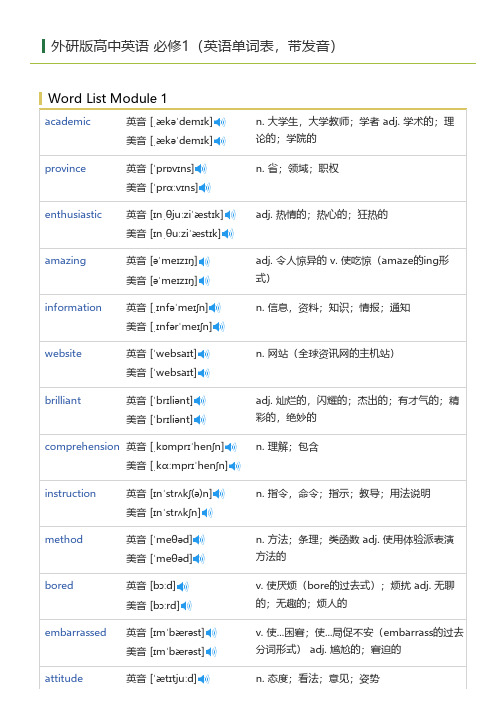
外研版高中英语 必修1(英语单词表,带发音)Word List Module 1academic英音 [ˌækəˈdemɪk]美音 [ˌækəˈdemɪk]n. 大学生,大学教师;学者 adj. 学术的;理论的;学院的province英音 [ˈprɒvɪns]美音 [ˈprɑːvɪns]n. 省;领域;职权enthusiastic英音 [ɪnˌθjuːziˈæstɪk]美音 [ɪnˌθuːziˈæstɪk]adj. 热情的;热心的;狂热的amazing英音 [əˈmeɪzɪŋ]美音 [əˈmeɪzɪŋ]adj. 令人惊异的 v. 使吃惊(amaze的ing形式)information英音 [ˌɪnfəˈmeɪʃn]美音 [ˌɪnfərˈmeɪʃn]n. 信息,资料;知识;情报;通知website英音 [ˈwebsaɪt]美音 [ˈwebsaɪt]n. 网站(全球资讯网的主机站)brilliant英音 [ˈbrɪliənt]美音 [ˈbrɪliənt]adj. 灿烂的,闪耀的;杰出的;有才气的;精彩的,绝妙的comprehension英音 [ˌkɒmprɪˈhenʃn]美音 [ˌkɑːmprɪˈhenʃn]n. 理解;包含instruction英音 [ɪnˈstrʌkʃ(ə)n]美音 [ɪnˈstrʌkʃn]n. 指令,命令;指示;教导;用法说明method英音 [ˈmeθəd]美音 [ˈmeθəd]n. 方法;条理;类函数 adj. 使用体验派表演方法的bored英音 [bɔːd]美音 [bɔːrd]v. 使厌烦(bore的过去式);烦扰 adj. 无聊的;无趣的;烦人的embarrassed英音 [ɪmˈbærəst]美音 [ɪmˈbærəst]v. 使...困窘;使...局促不安(embarrass的过去分词形式) adj. 尴尬的;窘迫的attitude英音 [ˈætɪtjuːd]n. 态度;看法;意见;姿势美音 [ˈætɪtuːd]behaviour英音 [bɪˈheɪvjə(r)]美音 [bɪˈheɪvjər]n. 行为;习性;运行状况(=behavior)previous英音 [ˈpriːviəs]美音 [ˈpriːviəs]adj. 以前的;早先的;过早的 adv. 在先;在…以前description英音 [dɪˈskrɪpʃn]美音 [dɪˈskrɪpʃn]n. 描述,描写;类型;说明书amazed英音 [əˈmeɪzd]美音 [əˈmeɪzd]v. 使…吃惊;把…弄糊涂(amaze的过去分词) adj. 惊奇的,吃惊的embarrassing英音 [ɪmˈbærəsɪŋ]美音 [ɪmˈbærəsɪŋ]adj. 使人尴尬的;令人为难的technology英音 [tekˈnɒlədʒi]美音 [tekˈnɑːlədʒi]n. 技术;工艺;术语impress英音 [ɪmˈpres]美音 [ɪmˈpres]n. 印象,印记;特征,痕迹 vi. 给人印象 vt.盖印;强征;传送;给予某人深刻印象correction英音 [kəˈrekʃn]美音 [kəˈrekʃn]n. 改正,修正encouragement英音 [ɪnˈkʌrɪdʒmənt]美音 [ɪnˈkɜːrɪdʒmənt]n. 鼓励enjoyment英音 [ɪnˈdʒɔɪmənt]美音 [ɪnˈdʒɔɪmənt]n. 享受;乐趣;享有fluency英音 [ˈfluːənsi]美音 [ˈfluːənsi]n. (语言、文章)流利;(技能)娴熟 n. 流畅度(写作演讲等)misunderstanding英音 [ˌmɪsʌndəˈstændɪŋ]美音 [ˌmɪsʌndərˈstændɪŋ]n. 误解;误会;不和disappointed英音 [ˌdɪsəˈpɔɪntɪd]美音 [ˌdɪsəˈpɔɪntɪd]adj. 失望的,沮丧的;受挫折的disappointing英音 [ˌdɪsəˈpɔɪntɪŋ]adj. 令人失望的;令人扫兴的 v. 令人失望(disappoint的ing形式);辜负…的期望Word List Module 2美音 [ˌd ɪs əˈp ɔɪnt ɪŋ]system英音 [ˈs ɪst əm]美音 [ˈs ɪst əm]n. 制度,体制;系统;方法teenager英音 [ˈti ːne ɪd ʒə(r)]美音 [ˈti ːne ɪd ʒər]n. 十几岁的青少年;十三岁到十九岁的少年disappear英音 [ˌd ɪs əˈp ɪə(r)]美音 [ˌd ɪs əˈp ɪr]vi. 消失;失踪;不复存在 vt. 使…不存在;使…消失move英音 [mu ːv]美音 [mu ːv]n. 移动;步骤;迁居;策略 vi. 移动;搬家,迁移;离开 vt. 移动;感动assistant英音 [əˈs ɪst ənt]美音 [əˈs ɪst ənt]n. 助手,助理,助教 adj. 辅助的,助理的;有帮助的cover英音 [ˈk ʌv ə(r)]美音 [ˈk ʌv ər]n. 封面,封皮;盖子;掩蔽物;幌子,借口 vt.包括;采访,报导;涉及 vi. 覆盖;代替diploma英音 [d ɪˈpl əʊm ə]美音 [d ɪˈplo ʊm ə]n. 毕业证书,学位证书;公文,文书;奖状vt. 发给…毕业文凭amusing英音 [əˈmju ːz ɪŋ]美音 [əˈmju ːz ɪŋ]adj. 有趣的,好玩的;引人发笑的 v. 逗乐;打发;使…高兴(amuse的ing形式)energetic英音 [ˌen əˈd ʒet ɪk]美音 [ˌen ər ˈd ʒet ɪk]adj. 精力充沛的;积极的;有力的intelligent英音 [ɪn ˈtel ɪd ʒənt]美音 [ɪn ˈtel ɪd ʒənt]adj. 智能的;聪明的;理解力强的nervous英音 [ˈn ɜːv əs]美音 [ˈn ɜːrv əs]adj. 神经的;紧张不安的;强健有力的organised英音 [ˈɔːɡəna ɪzd]美音 [ˈɔːrɡəna ɪzd]adj. 有组织的;组织起来的(等于organized) v. 组织;构成(organise的过…patient英音 [ˈpe ɪʃ(ə)nt]美音 [ˈpe ɪʃnt]n. 病人;患者 adj. 有耐心的,能容忍的serious英音 [ˈsɪəriəs]美音 [ˈsɪriəs]adj. 严肃的,严重的;认真的;庄重的;危急的shy英音 [ʃaɪ]美音 [ʃaɪ]n. 投掷;惊跳 adj. 害羞的;畏缩的,胆怯的vi. 投;畏缩;惊退;厌恶 vt. 投;乱掷strict英音 [strɪkt]美音 [strɪkt]adj. 严格的;绝对的;精确的;详细的impression英音 [ɪmˈpreʃ(ə)n]美音 [ɪmˈpreʃn]n. 印象;效果,影响;压痕,印记;感想;曝光(衡量广告被显示的次数。

高中英语外研版必修一高中英语外研版必修一课程是为高中生设计的英语基础课程,旨在帮助学生巩固和拓展英语基础知识,提高英语综合运用能力。
本课程内容涵盖了词汇、语法、听力、口语、阅读和写作等多个方面,通过多样化的教学活动,激发学生的学习兴趣,培养其自主学习能力。
首先,词汇部分是英语学习的基础。
在必修一的课程中,学生将学习到大量的常用词汇,包括日常生活、学校生活、工作职业等相关主题的词汇。
通过记忆、练习和应用,学生能够逐步扩大词汇量,为进一步的英语学习打下坚实的基础。
其次,语法是英语学习的重要组成部分。
在必修一的课程中,学生将系统学习英语语法规则,包括时态、语态、句子结构等。
通过大量的练习和实际运用,学生能够掌握正确的语法知识,提高英语表达的准确性。
听力是英语学习中的重要技能。
必修一的课程中,学生将通过听英语歌曲、观看英语视频、听英语广播等方式,提高英语听力水平。
同时,教师会引导学生学习听力技巧,如预测、抓取关键词等,帮助学生更有效地理解英语听力材料。
口语是英语学习的另一个关键方面。
在必修一的课程中,学生将通过角色扮演、小组讨论、演讲等活动,锻炼英语口语能力。
教师会鼓励学生大胆开口说英语,通过不断的实践,提高口语表达的流利度和准确性。
阅读是英语学习中不可或缺的一部分。
必修一的课程中,学生将阅读各种类型的英语文章,包括故事、新闻报道、科普文章等。
通过阅读,学生不仅能够提高英语阅读速度和理解能力,还能够拓宽知识面,了解不同文化背景。
写作是英语学习的输出环节。
在必修一的课程中,学生将学习如何写英语作文,包括记叙文、议论文、说明文等。
教师会教授学生写作技巧,如组织文章结构、使用恰当的词汇和语法等,帮助学生提高英语写作水平。
最后,必修一的课程还注重培养学生的跨文化交际能力。
通过学习英语国家的文化习俗、节日庆典等内容,学生能够更好地理解英语国家的文化背景,提高跨文化交流的能力。
总之,高中英语外研版必修一课程通过全面而系统的教学内容,旨在帮助学生建立扎实的英语基础,提高英语综合运用能力,为未来的英语学习和生活打下坚实的基础。
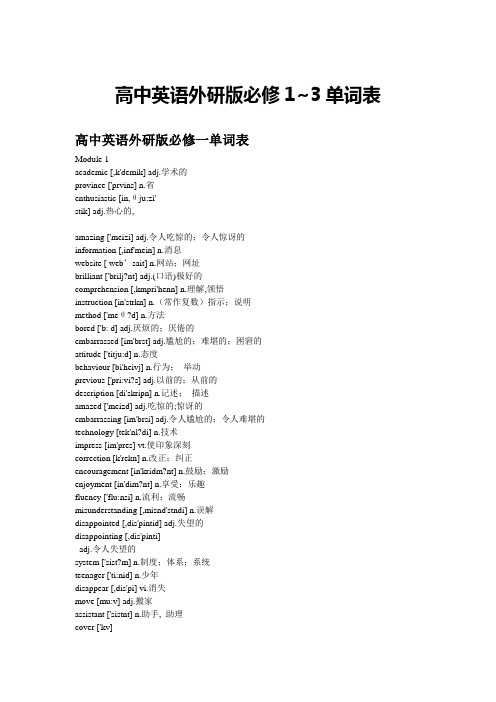
高中英语外研版必修1~3单词表高中英语外研版必修一单词表Module 1academic [,k'demik] adj.学术的province ['prvins] n.省enthusiastic [in,θju:zi'stik] adj.热心的,amazing ['meizi] adj.令人吃惊的;令人惊讶的information [,inf'mein] n.消息website [ web’sait] n.网站;网址brilliant ['brilj?nt] adj.(口语)极好的comprehension [,kmpri'henn] n.理解,领悟instruction [in'strkn] n.(常作复数)指示;说明method ['meθ?d] n.方法bored ['b: d] adj.厌烦的;厌倦的embarrassed [im'brst] adj.尴尬的;难堪的;困窘的attitude ['titju:d] n.态度behaviour [bi'heivj] n.行为;举动previous ['pri:vi?s] adj.以前的;从前的description [di'skripn] n.记述;描述amazed ['meizd] adj.吃惊的;惊讶的embarrassing [im'brsi] adj.令人尴尬的;令人难堪的technology [tek'nl?di] n.技术impress [im'pres] vt.使印象深刻correction [k'rekn] n.改正;纠正encouragement [in'kridm?nt] n.鼓励;激励enjoyment [in'dim?nt] n.享受;乐趣fluency ['flu:nsi] n.流利;流畅misunderstanding [,misnd'stndi] n.误解disappointed [,dis'pintid] adj.失望的disappointing [,dis'pinti]adj.令人失望的system ['sist?m] n.制度;体系;系统teenager ['ti:nid] n.少年disappear [,dis'pi] vi.消失move [mu:v] adj.搬家assistant ['sistnt] n.助手, 助理cover ['kv]vt.包含diploma [di'plum] n.文凭, 毕业证书in other words 换句话说look forward to 期待;盼望at the start of 在……开始的时候at the end of 在……结束的时候go to college 上大学be divided into 被(划)分成……take part in 参加Module 2amusing ['mju:zi] adj.有趣的;可笑的energetic [,en'detik] adj.精力充沛的intelligent [in'telidnt] adj.聪明的nervous ['n:vs] adj.紧张的;焦虑的organized [':g?naizd] adj.有组织的;有系统的patient ['peint] adj.耐心的serious ['siris] adj.严肃的shy [ai] adj.害羞的;羞怯的strict [strikt] a.严格的;严厉的impression [im'pren] n.印象avoid ['vid] vt.(故意)避开hate [heit] vt.讨厌;不喜欢incorrectly [,ink'rektli] adv.不正确地completely [k?m'pli:tli] adv.十分地;完全地immediately [i'mi:di?tli] adv.立即;即刻appreciate ['pri:ieit] vt.感激admit [d'mit] vt.承认scientific [,sai?n'tifik] adj.科学的literature ['litrt] n.文学loudly ['laudli] adv.大声地wave [weiv] vt.挥(手);招(手)joke [duk] n.玩笑;笑话summary ['sm?ri] n.总结;摘要;提要respect [ri'spekt] vt.&n.尊敬;尊重grade [greid] n.(美)成绩;分数headmaster ['hed'mɑ:st]n.校长headmistress ['hed'mistris] n.女校长period ['pirid] n.一段时间revision [ri'vin] n.复习translation [tr?ns'lein] n.翻译timetable ['taimteibl] n.时间表topic ['tpik] n.话题;题目vacation [vei'kein] n.假期revise [ri'vaiz] vt.温习(功课)discipline ['disiplin] n.纪律relationship [ri'leinip] n.关系formal ['f:m?l] adj.正式的relaxed [ri'l?kst] adj.轻松的;松懈的;宽松的similarly ['simil?li] adv.同样地, 类似地make sure 确定;确信;查明;弄清楚so that (引起表示结果的从句)因此make progress 取得进步as a result 结果in fact 事实上fall asleep 睡着tell jokes 讲笑话;开玩笑Module 3helicopter ['helikpt]n.直升飞机motorbike ['mut, baik] n.摩托车tram [tr?m] n.电车distance ['dist?ns] n.距离abandoned ['bndnd] adj.被遗弃的camel ['k?ml] n.骆驼cassette [k'set] n.录音带desert ['dez?t] n.沙漠diamond ['daimnd] n.钻石expert ['eksp:t] n.专家midnight ['midnait] n.半夜product ['prdkt] n.产品scenery ['si:n?ri] n.风景; 景色shoot [u:t] vt.(shot,shot)射杀soil [sil] n.土壤journey ['d:ni] n.旅程train [trein] vt.训练circus ['s:ks] n.马戏团seaside ['si:said] n.海滨stadium ['steidi?m] n.运动场;体育场eagle ['i:gl] n.鹰frighten ['fraitn] vt.是吃惊;惊吓kindergarten ['kind,gɑ:tn] n.幼儿园apartment ['pɑ:tm?nt] n.(美)公寓;单元住宅cartoon [kɑ:'tu:n] n.卡通;漫画interview ['int?vju:] n.面试;面谈interviewer ['intvju:] n.(面试时的)主考官;面谈者event [i'vent] n.事件exhausted [ig'z:stid] adj.疲惫不堪的downtown ['daun'taun] adj.商业区的;市中心的vacuum [`'vkjum] n.真空;空白rail [reil] n.铁轨ceremony ['serim?ni] n.仪式track [tr?k] n.轨道souvenir [,su:v'ni] n.纪念品get on 上(车、船等)get off 下(车、船等)get into 上(车)get out of 下(车)take off (飞机)起飞be short for 是……的缩写/简称not …any more 不再our of date 过时refer to 指的是Module 4survey [s'vei] n.调查neighbourhood n.四邻local ['lukl] adj.地方的;局部的suburb ['sb:b] n.城郊;郊区hometown [h?um'taun] n.家乡attractive ['trktiv] adj.有吸引力的;吸引人的fortunate ['f:tnit] adj.幸运的;吉祥的pretty ['priti] adv.很;相当sound [saund] vi.听起来tourist ['tu?rist]n.旅游者;观光客bother ['be]vt.打扰;烦扰;麻烦nuisance ['nju:sns] n.令人讨厌的人或事rent [rent] n.租金district ['distrikt] n.地域;区域;行政区approach ['prut] vt.接近harbour n.海港gorgeous ['g:ds] adj.美丽的;宜人的architecture ['ɑ:kitekt] n.建筑starve [stɑ:v] vi.饿死park [pɑ:k] vt.停车traffic ['tr?fik] n.交通committee [k'miti] n.委员会organization [':g?nai'zn] n.组织unemployed [,nim'plid] adj.失业的;没有工作的household ['haush?uld] n.家属;家人occupation [,kju'pein] n.职业professional [pr'fenl] adj.专业的manual ['mnjul] adj.用手的;手的employment [im'plim?nt] n.就业;工作;职业gallery ['glri] n.美术馆;画廊exchange [iks'teind] vt.交换fascinating ['fsineiti] adj.迷人的, 吸引人的afford ['f:d] vt.买得起;有能力支付survive [s'vaiv] vi.死里逃生;大难不死contact ['knt?kt] vt.联络;联系(某人)put up 修建so far 到目前为止up to now 到目前为止till now 到目前为止get away from 摆脱a great many 许多;大量a number of 许多;大量(谓语动词要用复数)the number of ……的数量(谓语动词要用单数)go up 上升Module 5liquid ['likwid] n.液体expand [ik'sp?nd] vi.膨胀contract ['kntr?kt] vi.收缩substance ['sbst?ns] n.物质mixture ['mikst] n.混合物oxygen ['ks?dn] n.氧气electricity [,ilek'trisiti] n.电stage [steid] n.阶段;时期conclusion [k?n'klu:n] n.结论aim [eim] n.目标;目的reaction [ri'kn] n.反应electrical [i'lektrik?l] adj.与电有关的;用电的equipment [i'kwipm?nt] n.设备;装备react [ri'kt] vi.(化学)反应potassium n.钾sodium ['sudim] n.钠calcium ['klsim] n.钙magnesium [mg'ni:zim] n.镁aluminium [,lju'minim] n.铝zinc [zi?k] n.锌partial ['pɑ:l] adj.部分的;局部的copper ['kp]n.铜oxide ['ksaid] n.氧化物rust [rst] vi.生锈boil [bil] vt.生锈ordinary [':din?ri] adj.普通的;平常的steam [sti:m] n.蒸汽;水气float [fl?ut] vi.漂浮form [f:m] vi.形成dissolve [di'zlv] vt.溶解;分解;分离balance ['blns] n.天平crucible ['kru:sibl] n.坩锅tongs [tz] (复)夹子;小钳子flame [fleim] n.火焰facility [f'siliti] n.(常作复数)设备;工具lecture ['lekt] n.演讲department [di'pɑ:tm?nt] n.(大学的)科、系astonished ['stnit] adj.吃惊的;惊愕的add…to…往……加入……used to 过去(常常)……in the area of 在……领域be proud of 为……感到骄傲/自豪be supposed to 应当;理应Module 6contain [k?n'tein] vt.包含;包括access ['kses] n.接近;通路crash [kr?] vi.(计算机)崩溃keyword ['ki: , w:d] n.密码;口令log [lg] vt.记录;登录software ['sftw]n.软件breakdown ['breikdaun] n.故障source [s:s] n.来源;出处accessible [k'sesbl] adj.可进入的;可使用的data ['deit] n.(复)数据defence [di'fens] n.保护;防卫create [kri:'eit] vt.创造;发明network ['netw:k] n.网络via [vai] prep.途径;经由percentage [p'sentid] n.百分数;百分率design [di'zain] vt.设计document ['dkjum?nt] n.文件invention [in'venn] n.发明permission [p'min] n.许可military ['milit?ri] adj.军事的;军队的concentrate ['kns?ntreit] vi.集中(注意力、思想等)definite ['definit] adj.明确的fantastic [fn'tstik] adj.极好的;美妙的independent [,indi'pend?nt] adj.独立的essay ['esei] n.文章pass [p?s] vt.超过frequently ['fri:kw?ntli] adv.时常;经常disadvantage [,dis?d'vɑ:ntid] n.弊端;缺点average ['vrid] adj.平均的statistics [st'tistiks] n.(复)统计数字shorten [':tn] vt.缩短sideways ['saidweiz] adv.横着地;斜着地Cincinnati n.辛辛那提(美国城市)search n.vt.& vi.搜寻;寻找in search of 寻找;追求geography n.地理书salesman n.售货员, 店员lad n.少年;小伙子request n.& vt.请求;要求store n.商店disappointment n.失望;沮丧bookseller n.书商ahead of 在…前面;优于sailor n.海员, 水手;水兵add vt.又说, 补充说eyebrow n.眉毛remainder n.剩余物consist of 由……组成as well 也become known as …作为……而出名;被称为……;叫作……go down 下降come up with 提出from that moment on 从那时起concentrate on 聚精会神;集中思想compared with 与……相比高中英语外研版必修二单词表Verb.1. diet 照医生的规定饮食2. injure 伤害3. head 朝…方向前进4. eye 注视, 观看5. breathe呼吸6. inject 注射7. reduce 减少8. disagree 不同意9. ban 禁止10. affect 影响11. recognize 认识, 认出12. lose 丢失, 失去13. compose 作曲, 创作14. tour 巡回演出, 旅行15. influence 影响16. record 录音17. mix 使混合18. paint 绘画, 画19. imitate 临摹, 模仿, 仿效20. observe观察, 注意到21. adopt 采纳, 采用22. aim 打算, 意欲23. stand 忍受24. realize 领悟, 了解, 实现25. destroy 破坏, 毁坏26. orbit 绕轨道飞行27. welcome 欢迎28. replace 代替, 取代29. found 建立, 创立30. produce 创作, 生产31. leap 跳跃, 飞跃32. interest 使感兴趣33. argue 争论Adj.& Adv.1. fit 健康的, 强健的2. rare 稀少的, 罕有的3. unhealthy 不健康的4. wealthy 富裕的, 有钱的5. rarely 稀少地, 极少地6. anxious 焦虑的, 不安的7. painful 疼痛的8. normal 正常的, 一般的9. overweight 太胖的10. awful 可怕的, 吓人的11. addictive 上瘾的12. powerful有力的/有功效的13. nearby附近的14. illegal 违法的, 不合法的15. likely 可能的16. horrible 令人不快的17. gymnastic 体操的18. musical 音乐的19. Austrian 奥地利的20. catchy 动人的21. complex 复杂的22. solo 独奏的23. colorful 彩色的24. contemporary 当代的25. delightful 令人愉快的26. traditional 传统的27. alive 有活力的28. unusual 不寻常的29. realistic 现实主义的30. aboard 在船上31. historical 历史性的32. amateur 业余的33. delighted 高兴的34. backstage 在后台35. cultural 文化的36. financial 金融的37. royal 皇家的, 皇室的38. female 女的, 女性的39. male 男的, 男性的40. graceful 优美的, 优雅的41. moving 感人的42. occasionally 有时, 偶尔43. entertaining有趣的Noun.1. diet 饮食, 日常饮食2. fat 脂肪3. flu 流感4. toothache 牙痛5. proverb 谚语6. captain 队长7. injury 伤害8. pain 疼痛9. lifestyle 生活方式10. lung 肺11. throat 喉咙, 咽喉, 嗓子12. pneumonia 肺炎13. prescription 处方14. symptom 症状15. X-ray X光16. insurance 保险17. questionnaire问卷/调查表18. drug 毒品, 药品19. bronchitis 支气管炎20. cancer 癌症21. cigarette 香烟22. tobacco 烟草, 烟丝23. cannabis 大麻24. cocaine 可卡因25. danger 危险26. addict 瘾君子27. needle 针, 针管28. burglary 盗窃, 窃案29. crime 罪行, 犯罪行为30. criminal 罪犯31. connection 联系, 关联32. ratio 比, 比率33. shoplifting 逛商店偷窃行为34. treatment 治疗35. adult 成人36. café餐馆, 咖啡馆37. participant参与者/参加者38. leaflet 传单, 印刷品39. distraction分心/分散注意力40. jogging 慢跑41. audience 听众42. choir 唱诗班, 合唱队43. classical 古典音乐44. composer 作曲家45. conductor 指挥46. jazz 爵士乐47. orchestra 管弦乐队/团48. saxophone 萨克斯管49. court 宫廷50. director 指挥51. genius 天才52. peasant 农民53. symphony 交响乐/交响曲54. talent 天分, 天赋, 才华55. Austria 奥地利56. prince 王子, 亲王57. album 专辑58. ballad 民歌, 民谣, 情歌59. band 乐队60. lyrics 歌词61. tune 曲调62. lecturer 讲师63. like 爱好, 嗜好64. dislike 憎恶, 不喜欢65. artist 艺术家66. drawing 图画67. painter 画家68. painting 绘画, 油画69. scene 景色, 风景70. aspect 方面71. reality 真实, 现实, 逼真72. style 风格73. exhibition 展览74. expression 表达, 表现75. landscape 风景, 风景画76. portrait 画像, 肖像, 人像77. watercolor 水彩画78. headline 标题79. photograph 照片80. celebrity 名人81. economy 经济82. politics 政治83. photographer 摄影师84. cosmonaut 宇航员85. navigator领航员/驾驶员86. taikonaut 太空人/宇航员87. universe 宇宙88. sailor 船员, 水手89. orbit 轨道90. capsule 太空舱91. flight 飞行, 航班92. congratulation 祝贺93. achievement 成就, 伟绩94. alien 外星人95. astronomer 天文学家96. autograph 亲笔签名97. fan 迷98. spaceship 宇宙飞船99. telescope 望远镜100. actor 演员101. part 角色102. politician 政治家103. belief 信念, 信条104. disbelief 不信, 怀疑105. evidence 证据106. review 评论107. poster 海报108. thriller 充满刺激的电影109. comedy 喜剧110. sword 剑111. actress 女演员112. character 角色, 人物113. masterpiece 杰作114. fiancé未婚夫115. rooftop 屋顶116. ad 广告117. channel 频道118. telly 电视119. drama 戏剧120. plot 情节121. setting 背景122. shark 鲨鱼123. section 部分,节Senior Book2Phrases1. be connected with 与…有联系2. take exercise锻炼3. be crazy about迷恋4. have a temperature发烧5. lie down躺下6. begin with以…开始7. put…into…将…投入…8. become ill生病9. related to有关系的10. break into破门而入11. belong to属于12. become addicted to沉迷于, 对…上瘾13. take one’s advice听某人的意见14. in order to为了…15. so as to为了…16. give up戒除, 放弃17. be impressed with留下深刻印象18. split up分裂, 分割19. make a note of记录20. be/get tired of对…厌烦21. be fond of喜欢, 喜爱22. tell by从…可以看出23. put off推迟, 延期24. take turns轮流25. a series of一系列的26. in total总共, 合计27. now that既然28. believe in相信29. be similar to和…相似30. come out出现, 出版31. fall in love with爱上/喜欢32. be in love with爱上/喜欢33. play a part扮演角色34. to one’s surprise令某人吃惊的是35. in surprise吃惊地36. care about关心, 顾虑37. every now and then有时38. at the age of在…岁时高中英语外研版必修三单词表1.across prep.横过;穿过(SH3 M1 P1)2.boot n.长统靴;皮靴(SH3 M1 P1)3.continental adj.大陆的;大洲的(SH3 M1 P1)4.face vt.面向;面对(SH3 M1 P1)5.range n.山脉(SH3 M1 P1)ndmark n.标志性建筑(SH3 M1 P2)7.gallery n.美术馆;画廊(SH3 M1 P2)8.situated adj.坐落(某处)的;位于(某处)的(SH3 M1 P2)9.symbol n.象征;符号(SH3 M1 P2)10.located adj.位于(SH3 M1 P2)11.architect n.建筑师(SH3 M1 P2)12.project n.计划;项目;工程(SH3 M1 P2)13.sculpture n.雕刻;泥塑(SH3 M1 P2)14.birthplace n.发源地(SH3 M1 P2)15.civilization n.文明(SH3 M1 P2)16.ancient adj.古代的(SH3 M1 P2)17.opposite prep.在……对面(SH3 M1 P4)18.sign vt.签署(SH3 M1 P7)19.agreement n.协议;契约(SH3 M1 P7)20.whereabouts adv.在哪里(SH3 M1 P8)ern vt.统治;治理(SH3 M1 P9)22.head n.领袖;领导人(SH3 M1 P9)23.representative n.代表(SH3 M1 P9)24.parliament n.国会;议会(SH3 M1 P9)25.region n.地区;区域(SH3 M1 P10)26.geographical adj.地理的(SH3 M1 P10)27.feature n.特点(SH3 M1 P10)28.produce n.产品;农产品(SH3 M1 P10)29.hunger n.饥饿(SH3 M2 P11)30.income n.收入(SH3 M2 P11)31.poverty n.贫穷(SH3 M2 P11)32.human n.(与动物等对比的)人(SH3 M2 P12)33.development n.发展(SH3 M2 P12)34.index n.指数(SH3 M2 P12)35.measure vt.测定;测量;评估(SH3 M2 P12)36.goal n.目标(SH3 M2 P12)37.expectancy n.(根据概率得出的)预期数额(SH3 M2 P12)38.position n.位置(SH3 M2 P12)cate vt.教育;培养;训练(SH3 M2 P12)40.figure n.数字(SH3 M2 P13)41.household n.一家人;家庭(SH3 M2 P14)42.homeless adj.无家可归的(SH3 M2 P14)43.charity n.慈善团体(SH3 M2 P15)44.crowded adj.拥挤的(SH3 M2 P16)45.freeway n.高速公路(SH3 M2 P16)46.inhabitant n.居民(SH3 M2 P16)47.similarity n.类似;相似(SH3 M2 P16)48.unfortunate adj.不幸的;遗憾的(SH3 M2 P16)49.location n.位置;所在地(SH3 M2 P16)50.tourism n.旅游业(SH3 M2 P16)51.transport n.交通工具(SH3 M2 P16)52.industrial adj.工业的(SH3 M2 P17)53.polluted adj.受到污染的(SH3 M2 P17)54.smart adj.漂亮的;整洁的;时髦的(SH3 M2 P17)55.vast adj.巨大的;庞大的;浩瀚的(SH3 M2 P17)56.entertainment n.娱乐(SH3 M2 P19)57.exchange n.交换(SH3 M2 P19)58.disaster n.灾难(SH3 M3 P21)59.flood n.洪水(SH3 M3 P21)60.hurricane n.飓风(SH3 M3 P21)61.lightning n.闪电(SH3 M3 P21)62.thunderstorm n.雷暴(SH3 M3 P21)63.tornado n.龙卷风(SH3 M3 P21)64.column n.柱状物;柱状体(SH3 M3 P21)65.experience vt.经历(SH3 M3 P21)66.cause vt.引起;导致(SH3 M3 P21)67.current n.海流;潮流(SH3 M3 P22)titude n.纬度(SH3 M3 P22)69.furniture n.家具(SH3 M3 P22)70.bury vt.埋葬(SH3 M3 P22)71.feather n.羽毛(SH3 M3 P22)72.fur n.(动物的)毛皮(SH3 M3 P22)73.occur vi.发生(SH3 M3 P22)74.tropical adj.热带的(SH3 M3 P22)75.equator n.赤道(SH3 M3 P22)76.rotating adj.旋转的;循环的(SH3 M3 P23)77.violent adj.猛烈的;激烈的;强烈的(SH3 M3 P23)78.wave n.波浪(SH3 M3 P23)79.strike vt.& n.(struck; struck/striken)(雷电、暴风雨等)袭击(SH3 M3 P23)80.cemetery n.墓地;公墓(SH3 M3 P23)81.coffin n.棺材(SH3 M3 P23)82.ruin vt.毁坏(SH3 M3 P24)83.ash n.灰(SH3 M3 P25)84.erupt vt.(火山的)爆发;喷发(SH3 M3 P25)va n.熔岩;岩浆(SH3 M3 P25)86.tidal adj.受潮水影响的;有涨落的(SH3 M3 P25)87.volcano n.火山(SH3 M3 P25)88.previous adj.以前的(SH3 M3 P25)89.eruption n.(火山的)爆发;喷发(SH3 M3 P25)90.possibility n.可能;可能性(SH3 M3 P25)91.earthquake n.地震(SH3 M3 P27)92.terrifying adj.吓人的;可怕的(SH3 M3 P28)93.luckily adv.幸运地;幸亏(SH3 M3 P28)94.thankfully adv.感激地;满怀感谢地(SH3 M3 P28)95.hopefully adv.满怀希望地;有希望地(SH3 M3 P28)96.sadly adv.伤心地;不幸地(SH3 M3 P28)97.fortunately adv.幸运地;幸亏(SH3 M3 P28)98.warning n.警告(SH3 M3 P28)99.worldwide adj.全世界的(SH3 M3 P29) 100.active adj.积极的;活跃的(SH3 M3 P29)101.damage n.& v.损失;损害(SH3 M3 P29)102.sandstorm n.沙尘暴(SH3 M4 P 31)103.frightening adj.吓人的;可怕的(SH3 M4 P 31)104.inland adj.内地的;内陆的(SH3 M4 P 31)105.mass adj.大量的;大规模的(SH3 M4 P 32)106.campaign n.战役;活动(SH3 M4 P 32)107.dune n.沙丘(SH3 M4 P 32)108.desertification n.(土地的)沙漠化(SH3 M4 P 32)109.process n.进程;过程(SH3 M4 P 32)110.citizen n.公民;市民(SH3 M4 P 32)111.dust n.沙尘;灰尘(SH3 M4 P 32)112.forecast vt.预报;预告(SH3 M4 P 32)113.strength n.力量;力气(SH3 M4 P 32)114.cycle vi.骑自行车(SH3 M4 P 32)115.mask n.面罩(SH3 M4 P 32)116.atmosphere n.大气;大气层(SH3 M4 P 35)117.carbon n.碳(SH3 M4 P 35)118.dioxide n.二氧化物(SH3 M4 P 35)119.chemical n.化学药品(SH3 M4 P 35)120.environment n.环境(SH3 M4 P 35)121.garbage n.废料;垃圾(SH3 M4 P 35)122.melt vi.融化(SH3 M4 P 35)123.pollution n.污染(SH3 M4 P 35)124.recycle v.重新利用;再循环(SH3 M4 P 35)125.coastal adj.沿海的(SH3 M4 P 35)126.concerned adj.关心的;担心的(SH3 M4 P 35) 127.evidence n.根据;证明(SH3 M4 P 35) 128.major adj.主要的;多数的(SH3 M4 P 35) 129.urgent adj.紧急的(SH3 M4 P 35) 130.pollute vt.污染(SH3 M4 P 35) plain vi.抱怨;发牢骚(SH3 M4 P 36) 132.nutshell n.坚果壳;简单的一句话(SH3 M4 P 38)133.scary adj.恐怖的;吓人的(SH3 M4 P 38)134.absolutely adv.绝对地;完全地(SH3 M4 P 38) 135.protection n.保护(SH3 M4 P 40)136.Module 5equal adj.平等的(SH3 M5 P 41) 137.importance n.重要;重要性(SH3 M5 P 41) 138.philosopher n.哲学家(SH3 M5 P 41) 139.philosophy n.哲学(SH3 M5 P 41) 140.teaching n.(常作复数)教导;学说(SH3 M5 P 41) 141.thinker n.思想(SH3 M5 P 41) 142.kindness n.善良(SH3 M5 P 41) 143.order n.秩序(SH3 M5 P 42) 144.principle n.原则;准则(SH3 M5 P 42) 145.position n.职位(SH3 M5 P 42) 146.stress vt.强(SH3 M5 P 43) 147.resign vi.辞职(SH3 M5 P 43) 148.adviser n.顾问(SH3 M5 P 43) 149.influential adj.有影响的(SH3 M5 P 43) 150.love n.仁爱(SH3 M5 P 43) 151.honesty n.诚实(SH3 M5 P 45) 152.justice n.公正(SH3 M5 P 45) 153.bark n.树皮(SH3 M5 P 46) 154.contribution n.贡献(SH3 M5 P 46)155.invent vt.发明(SH3 M5 P 46)156.leather n.皮革(SH3 M5 P 46)157.monk n.和尚(SH3 M5 P 46) 158.soft adj.柔软的(SH3 M5 P 46)159.category n.范畴;种类(SH3 M5 P 46)160.sutra n.(佛教的)经(SH3 M5 P 47)161.inventor n.发明家(SH3 M5 P 47)162.argument n.争论;辩论;议论(SH3 M5 P 47) 163.freedom n.自由(SH3 M5 P 48) 164.fuel n.燃料(SH3 M5 P 48)165.condition n.状况;条件;环境(SH3 M5 P 49)166.bulletin n.小型报刊;短新闻;报告(SH3 M6 P 51)167.canal n.运河(SH3 M6 P 51)168.civil adj.民用的;国内的(SH3 M6 P 51)169.cliff n.悬崖;峭壁(SH3 M6 P 51)170.dam n.坝;堤;水闸(SH3 M6 P 51) 171.engineering n.(土木)工程(SH3 M6 P 51) 172.gorge n.峡谷(SH3 M6 P 51) 173.hydro-electric adj.水力发电的(SH3 M6 P 51)174.reservoir n.水库(SH3 M6 P 51)175.structure n.建筑物;结构(SH3 M6 P 51) 176.terminal n.(机场的)集散站;终点站;候机厅(SH3 M6 P 51)177.date vi.始于(某一历史时期)(SH3 M6 P 51) 178.accommodate vt.容纳(乘客等)(SH3 M6 P 51) 179.carving n.(尤指木头、象牙等的)雕刻(SH3 M6 P 52) 180.construction n.建造;建设;建(SH3 M6 P 52) 181.relic n.(常作复数)(历史的)遗迹;(SH3 M6 P 52) 182.site n.场所;遗址(SH3 M6 P 52) 183.Buddhist n.佛教徒(SH3 M6 P 52) 184.generate vt.发(电)(SH3 M6 P 52) 185.harness vt.利用;将(自然力)变成动力(SH3 M6 P 52) 186.historical adj.历史的;有关历史的(SH3 M6 P 52) 187.narrow adj.狭窄的(SH3 M6 P 52) 188.poem n.诗;诗歌(SH3 M6 P 52) 189.submerge vt.浸入水中;淹没(SH3 M6 P 52) 190.global adj.全球的(SH3 M6 P 53) 191.watchtower n.望台(SH3 M6 P 53) 192.remove vt.迁移;搬迁(SH3 M6 P 53) 193.freezing adj.冷冰冰的;极冷的(SH3 M6 P 58) 194.ridiculous adj.荒唐的;可笑的(SH3 M6 P 58) 195.enormous adj.巨大的;庞大的(SH3 M6 P 58) 196.observatory n.观察台(SH3 M6 P 59) 197.foggy adj.有浓雾的(SH3 M6 P 59) 198.crash vi.(飞机)失事;坠毁(SH3 M6 P 59)199.because of 因为;由于200.be known as 作为……而出名/闻名201.ever since 自从……一直202.in terms of 据……;依据……203.on the other hand 另一方面;反过来说204.little by little 一点点地;逐渐地205.at the top of 在……顶端206.at the bottom of 在……底部207.make effort 努力208.be connected with 与……有联系;与……有关209.be close to 接近;靠近210.pick up 卷起;掀起211.take off 去掉212.on average 平均起来213.end up 结果为……, 以……结束214.set fire to 放火(焚烧)……215.catch fire 着火216.put out 扑灭(火)217.take place 发生218.in all 总共;总计219.cut down 砍倒220.be caught in 突然遭遇(风暴等)221.one after another 一个接一个地222.have a bad effect on 对……有坏影响223.take in 吸收224.give out 放出;发出225.in a nutshell 简言之;概括地讲226.look through 浏览227.be at war with 与……交战228.bring up 养育;抚养229.become interested in 对……感兴趣230.be proud of 为……自豪231.in conclusion 总之232.for the first time 第一次233.date from 起源于234.hold back 阻止e true (梦想等)变成现实236.make sense 有意义;有道理237.bring an end to 结束;终止。


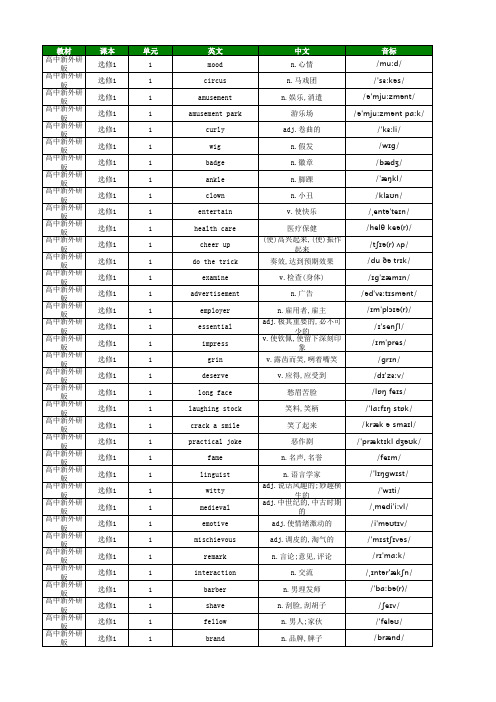
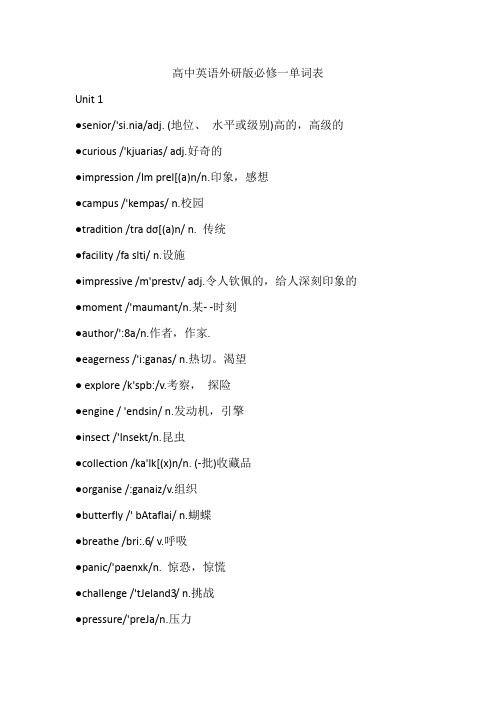
高中英语外研版必修一单词表Unit 1●senior/'si.nia/adj. (地位、水平或级别)高的,高级的●curious /'kjuarias/ adj.好奇的●impression /Im prel[(a)n/n.印象,感想●campus /'kempas/ n.校园●tradition /tra dσ[(a)n/ n. 传统●facility /fa slti/ n.设施●impressive /m'prestv/ adj.令人钦佩的,给人深刻印象的●moment /'mau mant/n.某- -时刻●author/':8a/n.作者,作家.●eagerness /'i:ganas/ n.热切。
渴望● explore /k'spb:/v.考察,探险●engine / 'endsin/ n.发动机,引擎●insect /'Insekt/n.昆虫●collection /ka'lk[(x)n/n. (-批)收藏品●organise /:ganaiz/v.组织●butterfly /' bAtaflai/ n.蝴蝶●breathe /bri:.6/ v.呼吸●p anic/'paenxk/n. 惊恐,惊慌●challenge /'tJeland3/ n.挑战●pressure/'preJa/n.压力●calm /ka:m/ adj.镇静的。
沉着的●description /di skrpl(a)n/n.描述,捕写,叙述。
形容● confident / konftdant/ adj.有信心的,自信的●poster / pausta/ n.海报●badminton /'bedmntan/ n.羽毛球●drama /'dra:ma/ n.戏剧●band /baend/n.乐队,乐团●debate /dr'bert/n.讨论,辩论●gym /d31m/n.体育馆,健身房●piano/pi' aenau/ n.钢琴●stage /sterd3/ n.舞台●photography /fa'tografi/ n.摄影Unit 2●title /'tartal/n.题目,标题●ham /haem/n.火腿●eggplant /'egpla:nt/ n.茄子●pine /pain/ n.松树●pineapple / 'pain xepal/ n.菠萝●sculpt /skAlpt/v.雕刻,雕塑●sculpture /'sklptjar/ n.雕像,雕刻品,雕塑作品●seasick / si:sk/ adj.晕船的● airsick /'easik/ adj.晕机的●carsick /'ko:sIk/ adj. 晕车的●homesick /' haumsIk/ adj想家的●opposing /a'pauzn/adj. (观点,意见等)相反的,相对立的●behavior /bI'hervjar/n.举止,行为●confusing /kan"fju:zan/ adj.令人困惑的●capitalized /'kaeprtalaizd/ adj.大写的●unique /ju:"ni:k/ adj.独-无二的,独特的●burnup烧毁,烧尽● burn down烧毁●alarm/a"la:m/n. 警报器;闹钟●reflect /n'fiekt/v.显示,反映●creativity / kr:er'tvati/n.创造性,创造力●visible /'vzabal/ adj.看得见的,可见的。

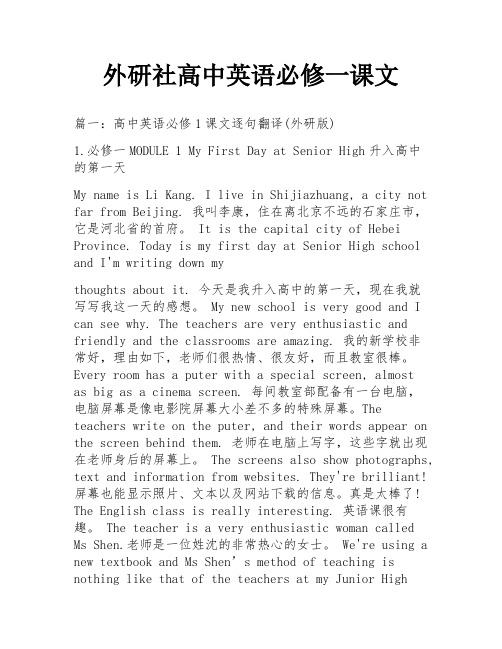
外研社高中英语必修一课文篇一:高中英语必修1课文逐句翻译(外研版)1.必修一MODULE 1 My First Day at Senior High升入高中的第一天My name is Li Kang. I live in Shijiazhuang, a city not far from Beijing. 我叫李康,住在离北京不远的石家庄市,它是河北省的首府。
It is the capital city of Hebei Province. Today is my first day at Senior High school and I'm writing down mythoughts about it. 今天是我升入高中的第一天,现在我就写写我这一天的感想。
My new school is very good and I can see why. The teachers are very enthusiastic and friendly and the classrooms are amazing. 我的新学校非常好,理由如下,老师们很热情、很友好,而且教室很棒。
Every room has a puter with a special screen, almostas big as a cinema screen. 每间教室部配备有一台电脑,电脑屏幕是像电影院屏幕大小差不多的特殊屏幕。
The teachers write on the puter, and their words appear on the screen behind them. 老师在电脑上写字,这些字就出现在老师身后的屏幕上。
The screens also show photographs, text and information from websites. They're brilliant! 屏幕也能显示照片、文本以及网站下载的信息。

Words and expressions in NSE SH books 1-8 必修11 课1. academic adj.学术的2. province n.省3. enthusiastic adj.热心的4. amazing adj.令人吃惊的;令人惊讶的5. information n.信息(SH1 M1 P1) (SH1 M1 P2) (SH1 M1 P2) (SH1 M1 P2) (SH1 M1 P2) (SH1 M1 P2) (SH1 M1 P2) (SH1 M1 P2) (SH1 M1 P2) (SH1 M1 P3) (SH1 M1 P3) (SH1 M1 P3) (SH1 M1 P3) (SH1 M1 P3) (SH1 M1 P3) (SH1 M1 P3) (SH1 M1 P2) (SH1 M1 P4) (SH1 M1 P4) (SH1 M1 P4) (SH1 M1 P5) (SH1 M1 P5) (SH1 M1 P5) (SH1 M1 P5) (SH1 M1 P5) (SH1 M1 P6) (SH1 M1 P7) (SH1 M1 P7) (SH1 M1 P8) (SH1 M1 P8) (SH1 M1 P8) (SH1 M1 P8) (SH1 M1 P9) (SH1 M1 P9)6. website n.网站;网址7. brilliant adj.(口语)极好的8. comprehension n.理解;领悟9. instruction n.(常作复数)指示;说明10. method n.方法11. bored adj.厌烦的; 厌倦的12. embarrassed adj.尴尬的;难堪的;困窘的13. attitude n.态度14. behaviour n.行为;举动15. previous adj.以前的;从前的16. description n.记述;描述17. amazed adj.吃惊的;惊讶的18. embarrassing adj.令人尴尬的;令人难堪的19. technology n.技术20. impress vt.使印象深刻21. correction n.改正;纠正22. encouragement n.鼓励;激励23. enjoyment n.享受;乐趣24. fluency n.流利;流畅25. misunderstanding n.误解26. disappointed adj.失望的27. disappointing adj.令人失望的28. system n.制度;体系;系统29. teenager n.少年30. disappear vi.消失31. move vi.搬家32. assistant n.助手;助理33. cover vt.包含34. diploma n.文凭;毕业证书35. in other words 换句话说36. look forward to 期待;盼望37. at the start of 在……开始的时候38. at the end of 在……结束的时候39. go to college 上大学40. be divided into 被(划)分成……41. take part in 参加2课1. amusing adj. 有趣的;可笑的2. energetic adj. 精力充沛的3. intelligent adj. 聪明的4. nervous adj. 紧张的;焦虑的5. organised adj. 有组织的;有系统的6. patient adj. 耐心的(SH1 M2 P11) (SH1 M2 P11) (SH1 M2 P11) (SH1 M2 P11) (SH1 M2 P11) (SH1 M2 P11) (SH1 M2 P11) (SH1 M2 P11) (SH1 M2 P11) (SH1 M2 P12) (SH1 M2 P12) (SH1 M2 P12) (SH1 M2 P12) (SH1 M2 P12) (SH1 M2 P12) (SH1 M2 P12) (SH1 M2 P12) (SH1 M2 P12) (SH1 M2 P12) (SH1 M2 P12) (SH1 M2 P12) (SH1 M2 P12) (SH1 M2 P12) (SH1 M2 P12) (SH1 M2 P13) (SH1 M2 P15) (SH1 M2 P15) (SH1 M2 P15)7. serious adj. 严肃的8. shy adj. 害羞的;羞怯的9. strict adj. 严格的;严厉的10. impression n. 印象11. avoid vt. (故意)避开12. hate vt. 讨厌;不喜欢13. incorrectly adv. 不正确地14. completely adv. 十分地;完全地15. immediately adv. 立即,即刻16. appreciate vt. 感激17. admit vt. 承认18. scientific adj. 科学的19. literature n. 文学20. loudly adv. 大声地21. wave vt. 挥(手);招(手)22. joke n. 玩笑;笑话23. summary n. 总结;摘要;提要24. respect vt. & n. 尊敬;尊重25. grade n.(美)成绩;分数26. headmaster n. 校长27. headmistress n. 女校长28. period n. 一段时间29. revision n. 复习 (SH1 M2 P15)(SH1 M2 P15)(SH1 M2 P15)(SH1 M2 P15)(SH1 M2 P15)(SH1 M2 P17)(SH1 M2 P18)(SH1 M2 P19)(SH1 M2 P19)(SH1 M2 P19)(SH1 M2 P19)30. translation n. 翻译 31. timetable n. 时间表 32. topic n. 话题;题目 33. vacation n. 假期 34. revise vt. 温习(功课) 35. discipline n. 纪律 36. relationship n. 关系 37. formal adj. 正式的 38. relaxed adj. 轻松的;松懈的;宽松的 39. similarly adv. 同样地,类似地 40. make sure 确定;确信;查明;弄清楚41. so that (引起表示结果的从句)因此42. make progress 取得进步43. as a result 结果44. in fact 事实上45. fall asleep 睡着46. tell jokes 讲笑话;开玩笑3 课1. helicopter n. 直升飞机2. motorbike n. 摩托车3. tram n. 电车4. distance n. 距离5. abandoned adj. 被遗弃的6. camel n. 骆驼7. cassette n. 录音带8. desert n. 沙漠 (SH1 M3 P21)(SH1 M3 P21)(SH1 M3 P21)(SH1 M3 P21)(SH1 M3 P22)(SH1 M3 P22)(SH1 M3 P22)(SH1 M3 P22)(SH1 M3 P22)(SH1 M3 P22)(SH1 M3 P22)(SH1 M3 P22)(SH1 M3 P22)(SH1 M3 P22)(SH1 M3 P22)(SH1 M3 P23)(SH1 M3 P23) 9. diamond n. 钻石 10. expert n. 专家 11. midnight n. 半夜 12. product n. 产品 13. scenery n. 风景;景色 14. shoot vt. (shot, shot) 射杀 15. soil n. 土壤 16. journey n. 旅程 17. train vt. 训练18. circus n. 马戏团 19. seaside n. 海滨 20. stadium n. 运动场;体育场 21. eagle n. 鹰 22. frighten vt. 使吃惊;惊吓 23. kindergarten n. 幼儿园 24. apartment n. (美)公寓;单元住宅 25. cartoon n. 卡通;漫画 26. interview n. 面试;面谈 27. interviewer n.(面试时的)主考官;面谈者 28. event n. 事件 29. exhausted adj. 疲惫不堪的 30. downtown adj. 商业区的;市中心的 31. vacuum n. 真空;空白 32. rail n. 铁轨 (SH1 M3 P25)(SH1 M3 P25)(SH1 M3 P25)(SH1 M3 P26)(SH1 M3 P26)(SH1 M3 P26)(SH1 M3 P26)(SH1 M3 P26)(SH1 M3 P27)(SH1 M3 P28)(SH1 M3 P28)(SH1 M3 P28)(SH1 M3 P29)(SH1 M3 P29)(SH1 M3 P29)(SH1 M3 P29)(SH1 M3 P29)(SH1 M3 P30)33. ceremony n. 仪式 34. track n. 轨道 35. souvenir n. 纪念品 36. get on 上(车、船等)37. get off 下(车、船等)38. get into 上(车)39. get out of 下(车)40. take off (飞机)起飞41. be short for 是……的缩写/简称42. not …any more 不再43. out of date 过时44. refer to 指的是4 课1. survey n. 调查 (SH1 M4 P31)(SH1 M4 P31)(SH1 M4 P31)(SH1 M4 P31)(SH1 M4 P32)(SH1 M4 P32)(SH1 M4 P32)(SH1 M4 P32) 2. neighbourhood n. 四邻;街坊 3. local adj. 地方的;局部的 4. suburb n. 城郊;郊区 5. hometown n. 家乡 6. attractive adj. 有吸引力的;吸引人的 7. fortunate adj. 幸运的;吉祥的 8. pretty adv. 很;相当9. sound vi.听起来10. tourist n.旅游者;观光客11. bother vt.打扰;烦扰;麻烦12. nuisance n.令人讨厌的人或事13. rent n.租金14. district n.地域;区域;行政区15. approach vt.接近16.harbour n.海港(SH1 M4 P32) (SH1 M4 P32) (SH1 M4 P32) (SH1 M4 P32) (SH1 M4 P32) (SH1 M4 P33) (SH1 M4 P33) (SH1 M4 P33)17. gorgeous adj.美丽的;宜人的18. architecture n.建筑19. starve vi.饿死(SH1 M4 P33) (SH1 M4 P33) (SH1 M4 P33)20. park vt.停车21. traffic n.交通(SH1 M4 P33) (SH1 M4 P35) (SH1 M4 P35) (SH1 M4 P35) (SH1 M4 P35) (SH1 M4 P35) (SH1 M4 P35) (SH1 M4 P35) (SH1 M4 P35) (SH1 M4 P35) (SH1 M4 P37) (SH1 M4 P37) (SH1 M4 P38) (SH1 M4 P39) (SH1 M4 P39) (SH1 M4 P40)22. committee n.委员会23. organisation n.组织24. unemployed adj.失业的;没有工作的25. household n.家属;家人26. occupation n.职业27. professional adj.专业的28. manual adj.用手的;手的29. employment n.就业;工作;职业30. gallery n.美术馆;画廊31. exchange vt.交换32. fascinating adj.迷人的;吸引人的33. afford vt.买得起;有能力支付34. survive vi.死里逃生;大难不死35. contact vt.联络;联系(某人)36. put up 修建37. so far 到目前为止38. up to now 到目前为止39. till now 到目前为止40. get away from 摆脱41. a great many 许多;大量42. a number of 许多;大量43. go up 上升5课1. liquid n. 液体 (SH1 M5 P41)(SH1 M5 P41)(SH1 M5 P41)(SH1 M5 P41)(SH1 M5 P41)(SH1 M5 P41)(SH1 M5 P41)(SH1 M5 P44)(SH1 M5 P44)(SH1 M5 P44)(SH1 M5 P44)(SH1 M5 P44)(SH1 M5 P44)(SH1 M5 P44)(SH1 M5 P44)(SH1 M5 P44)(SH1 M5 P44)(SH1 M5 P44)(SH1 M5 P44)(SH1 M5 P44)(SH1 M5 P44)(SH1 M5 P44)(SH1 M5 P44)(SH1 M5 P45)(SH1 M5 P45)(SH1 M5 P45)(SH1 M5 P46)(SH1 M5 P46)(SH1 M5 P46)(SH1 M5 P46)(SH1 M5 P46)(SH1 M5 P46)(SH1 M5 P46)(SH1 M5 P48)(SH1 M5 P49)(SH1 M5 P49)(SH1 M5 P49)2. expand vi. 膨胀3. contract vi. 收缩4. substance n. 物质5. mixture n. 混合物6. oxygen n. 氧气7. electricity n. 电8. stage n. 阶段;时期9. conclusion n. 结论 10. aim n. 目标;目的 11. reaction n. 反应 12. electrical adj. 与电有关的;用电的 13. equipment n. 设备;装备 14. react vi. (化学)反应 15. potassium n. 钾 16. sodium n. 钠 17. calcium n. 钙 18. magnesium n. 镁 19. aluminium n. 铝 20. zinc n. 锌 21. partial adj. 部分的;局部的 22. copper n. 铜 23. oxide n. 氧化物 24. rust vi. 生锈 25. boil vt. 煮;煮沸 26. ordinary adj. 普通的;平常的 27. steam n. 蒸汽;水气 28. float vi. 漂浮 29. form vi. 形成 30. dissolve vi. 溶解;分解;分离 31. balance n. 天平 32. crucible n. 坩埚 33. tongs n. 夹子;小钳子;镊子 34. flame n. 火焰 35. facility n. (常作复数)设备;工具 36. lecture n. 演讲 37. department n. (大学的)科、系38. astonished adj.吃惊的;惊愕的39. add …to …往……加入……40. used to 过去(常常)……41. in the area of 在……领域(SH1 M5 P49)42. be proud of 为……感到骄傲/自豪43. be supposed to 应当;理应6课44. contain vt.包含;包括45. access n.接近;通路46. crash vi.(计算机)崩溃47. keyword n.密码;口令48. log vt.记录;登录(SH1 M6 P51) (SH1 M6 P51) (SH1 M6 P51) (SH1 M6 P51) (SH1 M6 P51) (SH1 M6 P51) (SH1 M6 P51) (SH1 M6 P52) (SH1 M6 P52) (SH1 M6 P52) (SH1 M6 P52) (SH1 M6 P52) (SH1 M6 P52) (SH1 M6 P52) (SH1 M6 P52) (SH1 M6 P52) (SH1 M6 P52) (SH1 M6 P53) (SH1 M6 P53) (SH1 M6 P52) (SH1 M6 P54) (SH1 M6 P54) (SH1 M6 P54) (SH1 M6 P54) (SH1 M6 P56) (SH1 M6 P57) (SH1 M6 P57) (SH1 M6 P57) (SH1 M6 P57)49. software n.软件50. breakdown n.故障51. source n.来源;出处52. accessible adj.可进入的;可使用的53. data adj.(复)数据54. defence n.保护;防卫55. create vt.创造;发明56. network n.网络57. via prep.途经;经由58. percentage n.百分数;百分率59. design vt.设计60. document n.文件61. invention n.发明62. permission n.许可63. military adj.军事的;军队的64. concentrate vi.集中(注意力、思想等)65. definite adj.明确的66. fantastic adj.极好的;美妙的67. independent adj.独立的68. essay n.文章69. pass vt.超过70. frequently adv.时常;经常71. disadvantage n.弊端;缺点72. average adj.平均的73. statistics n.统计数字74. shorten vt.缩短75. sideways adv.横着地;斜着地76. consists of 由……组成77. as well 也(SH1 M6 P58) (SH1 M6 P59) (SH1 M6 P59)78. become known as …作为……而出名;被称为……;叫作……79. go down 下降80. come up with 提出81. from that moment on 从那时起82. concentrate on 聚精会神;集中思想83. compared with 与……相比。
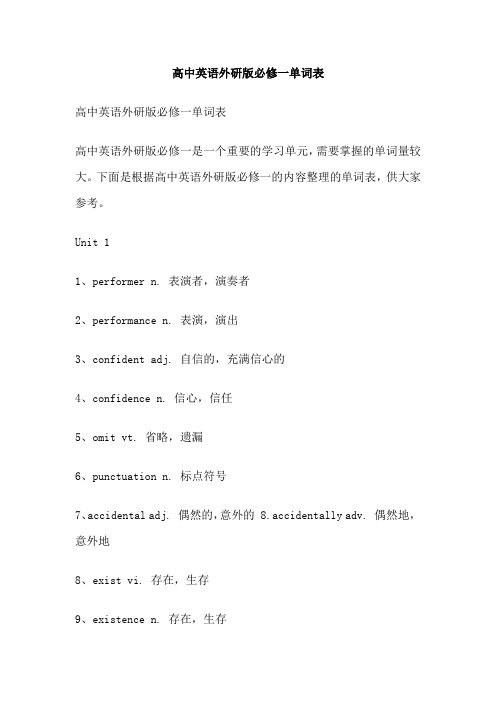
高中英语外研版必修一单词表高中英语外研版必修一单词表高中英语外研版必修一是一个重要的学习单元,需要掌握的单词量较大。
下面是根据高中英语外研版必修一的内容整理的单词表,供大家参考。
Unit 11、performer n. 表演者,演奏者2、performance n. 表演,演出3、confident adj. 自信的,充满信心的4、confidence n. 信心,信任5、omit vt. 省略,遗漏6、punctuation n. 标点符号7、accidental adj. 偶然的,意外的 8.accidentally adv. 偶然地,意外地8、exist vi. 存在,生存9、existence n. 存在,生存10、form vt. 构成,组成11、formula n. 公式,准则12、organ n. 器官13、undergo vt. 经历,遭受14、undergoer n. 经历者,承受者15、changeable adj. 可变的,易变的16、valley n. 山谷,峡谷 18.自怨自艾、自尊自爱 adj.& n. 19.以内而外 ad./a. 从内到外/的Unit 21、repetition n. 重复,反复2、regularly adv. 有规律地,定期地3、regular adj. 有规律的,定期的4、ritual n. 仪式,惯例5、lose vt. 失去,遗失6、loss n. 失去,遗失7、lyrics n. 歌词8、alive adj. 活着的,存在的9、live vi./adv. 生活,居住10、lifestyle n. 生活方式11、melody n. 旋律,曲调12、comma n. 逗号13、possess vt. 拥有,具有14、possession n. 拥有,占有15、bless vt. 祝福,保佑16、blessed adj. 受祝福的,受保佑的17、exist vi. 存在,生存 18.. existence n. 存在,生存。

(新外研版)高中英语必修一全册知识点汇总期末复习必备Unit1A new start知识点:1.impression n.印象;感想【词汇拓展】impress vt.使钦佩;使敬仰;给……留下深刻印象impressive adj.令人赞叹的;令人敬佩的make/leave/have a(n)...impression on sb.给某人留下……的印象impress sb.with sth.某事(物)给某人留下印象impress sth.on/upon sb.使某人铭记某事be impressed by/with...对……印象深刻2.turn around转身【词汇拓展】turn away转过脸去;把……驱逐出去;解雇turn down降低,减弱;拒绝turn back折回,往回走;使停止前进,挡住turn into变成;进入turn on打开turn off关掉turn out生产;出产;结果是turn over反转;翻过来;翻身;移交turn to向……求助;翻到(书页);开始行动turn up把……向上翻;卷起;出现,到来3.breathe v.呼吸【词汇拓展】breath n.呼吸;气息breathe in/out吸气/呼气out of breath上气不接下气take a deep breath深吸一口气hold one’s breath屏住呼吸4.in panic惊慌地【词汇拓展】get into a panic陷入惊慌中panic sb.into doing sth.使某人仓皇行事;使某人仓促行动There’s no panic.不用着急。
There’s no point getting into a panic about the exam.It’s not as difficult as you imagine. 5.embarrassed adj.尴尬的;难堪的【词汇拓展】embarrass vt.使尴尬;使难堪;使窘迫embarrassing adj.令人尴尬的;令人困窘的embarrassment n.窘迫;令人困窘的人或物to one’s embarrassment令某人尴尬的是6.fit adj.健康的;强健的;合适的v.适合;合身;安装【词汇拓展】be fit for适合;胜任be fit to do适合做……keep/stay fit保持健康fit in with与……相适应,与……相协调注意:(1)fit指大小、尺寸、形状合适,引申为“吻合”;(2)suit指款式、需要、口味、条件、地位、衣着适合某人,使人看上去有吸引力;另外,用于比喻意义时多用suit;(3)match多指大小、颜色、形状等一致,通常被译为“匹配”。

外研版高中英语 必修3(英语单词表,带发音)Word List Module 1across英音 [əˈkrɒs]美音 [əˈkrɔːs]prep. 穿过;横穿 adv. 横过;在对面boot英音 [buːt]美音 [buːt]n. 靴子;踢;汽车行李箱 vt. 引导;踢;解雇;使穿靴continental英音 [ˌkɒntɪˈnent(ə)l]美音 [ˌkɑːntɪˈnentl]n. 欧洲人 adj. 大陆的;大陆性的face英音 [feɪs]美音 [feɪs]n. 脸;表面;面子;面容;外观;威信 vi.向;朝 vt. 面对;面向;承认;抹盖range英音 [reɪnd ʒ]美音 [reɪndʒ]n. 范围;幅度;排;山脉 vt. 漫游;放牧;使并列;归类于;来回走动 vi. (在...内)变动…landmark英音 [ˈlændmɑːk]美音 [ˈlændmɑːrk]n. [航]陆标;地标;界标;里程碑;纪念碑;地界标;划时代的事 adj. 有重大意义或影响的gallery英音 [ˈɡæləri]美音 [ˈɡæl əri]n. 画廊;走廊;旁听席;地道 vt. 在…修建走廊;在…挖地道 vi. 挖地道situated英音 [ˈsɪtʃueɪtɪd]美音 [ˈsɪtʃueɪtɪd]v. 使位于;使处于(situate的过去分词) adj.位于…的;处于…境遇的symbol英音 [ˈsɪmb(ə)l]美音 [ˈsɪmbl]n. 象征;符号;标志located英音 [ləʊˈkeɪt ɪd]美音 [ˈloʊkeɪt ɪd]adj. 处于,位于;坐落的architect英音 [ˈɑːkɪtekt]美音 [ˈɑːrkɪtekt]n. 建筑师 缔造者project英音 [ˈprɒd ʒekt]美音 [ˈprɑːd ʒekt]n. 工程;计划;事业 vt. 设计;计划;发射;放映 vi. 设计;计划;表达;投射sculpture英音 [ˈskʌlptʃə(r)]n. 雕塑;雕刻;刻蚀 vt. 雕塑;雕刻;刻蚀 vi.美音 [ˈskʌlptʃər]从事雕刻birthplace英音 [ˈbɜːθpleɪs]美音 [ˈbɜːrθpleɪs]n. 出生地 发源地civilisation英音 [ˌsɪvəlaɪˈzeɪʃ(ə)n]美音 [ˌsɪvəlɪˈzeɪʃən]n. (英)文明(等于civilization)ancient英音 [ˈeɪnʃənt]美音 [ˈeɪnʃənt]n. 古代人;老人 adj. 古代的;古老的,过时的;年老的opposite英音 [ˈɒpəzɪt]美音 [ˈɑːpəzɪt]adj. 相反的;对面的;对立的 n. 对立面;反义词 prep. 在…的对面 adv. 在对面sign英音 [saɪn]美音 [saɪn]n. 迹象;符号;记号;手势;指示牌 vt. 签署;示意 vi. 签署;签名agreement英音 [əˈɡriːmənt]美音 [əˈɡriːmənt]n. 协议;同意,一致whereabouts英音 [ˈweərəbaʊts]美音 [ˈwerəbaʊts; ˌwerəˈbaʊts]n. 下落;行踪;去向;所在之处 adv. 在何处;靠近什么地方govern英音 [ˈɡʌv(ə)n]美音 [ˈɡʌvərn]vt. 管理;支配;统治;控制 vi. 居支配地位;进行统治head 英音 [hed]美音 [hed]n. 头;头痛;上端;最前的部分;理解力 adj.头的;主要的;在顶端的 vt. 前进;用头顶…representative英音 [ˌreprɪˈzentətɪv]美音 [ˌreprɪˈzentətɪv]n. 代表;典型;众议员 adj. 典型的,有代表性的;代议制的parliament英音 [ˈpɑːləmənt]美音 [ˈpɑːrləmənt]n. 议会,国会region英音 [ˈriːdʒən]美音 [ˈriːdʒən]n. 地区;范围;部位geographical英音 [ˌdʒiːəˈɡræfɪk(ə)l]美音 [ˌdʒiːəˈɡræfɪkl]adj. 地理的;地理学的feature英音 [ˈfiːtʃə(r)]n. 特色,特征;容貌;特写或专题节目 vt. 特写;以…为特色;由…主演 vi. 起重要作用Word List Module 2美音 [ˈfi ːt ʃər]produce英音 [pr əˈdju ːs]美音 [pr əˈdu ːs]n. 农产品,产品 vt. 生产;引起;创作;生育,繁殖 vi. 生产,创作hunger英音 [ˈh ʌŋɡə(r)]美音 [ˈh ʌŋɡər]n. 饿,饥饿;渴望 vt. 使……挨饿 vi. 渴望;挨饿income英音 [ˈɪnk ʌm]美音 [ˈɪnk ʌm; ˈɪnk əm]n. 收入,收益;所得poverty英音 [ˈp ɒv əti]美音 [ˈpɑːv ərti]n. 贫困;困难;缺少;低劣human英音 [ˈhju ːm ən]美音 [ˈhju ːm ən]n. 人;人类 adj. 人的;人类的development英音 [d ɪˈvel əpm ənt]美音 [d ɪˈvel əpm ənt]n. 发展;开发;发育;住宅小区(专指由同一开发商开发的);[摄] 显影index英音 [ˈɪndeks]美音 [ˈɪndeks]n. 指标;指数;索引;指针 vt. 指出;编入索引中 vi. 做索引measure英音 [ˈme ʒə(r)]美音 [ˈme ʒər]n. 测量;措施;程度;尺寸 vt. 测量;估量;权衡 vi. 测量;估量goal英音 [ɡəʊl]美音 [ɡo ʊl]n. 目标;球门,得分数;终点 vi. 攻门,射门得分expectancy英音 [ɪk ˈspekt ənsi]美音 [ɪk ˈspekt ənsi]n. 期望,期待educate英音 [ˈed ʒuke ɪt]美音 [ˈed ʒuke ɪt]vt. 教育;培养;训练 vi. 教育;训练figure英音 [ˈf ɪɡə(r)]美音 [ˈf ɪɡj ər]n. 数字;人物;图形;价格;(人的)体形;画像 vt. 计算;认为;描绘;象征 vi. 计算;…household英音 [ˈha ʊsh əʊld]美音 [ˈha ʊsho ʊld]n. 全家人,一家人;(包括佣工在内的)家庭,户 adj. 家庭的;日常的;王室的homeless英音 [ˈhəʊmləs]美音 [ˈhoʊmləs]adj. 无家可归的 无家可归的人 无家可归charity英音 [ˈtʃærəti]美音 [ˈtʃærəti]n. 慈善;施舍;慈善团体;宽容;施舍物crowded英音 [ˈkraʊdɪd]美音 [ˈkraʊdɪd]adj. 拥挤的;塞满的 v. 拥挤(crowd的过去分词)freeway英音 [ˈfriːweɪ]美音 [ˈfriːweɪ]n. 高速公路inhabitant英音 [ɪnˈhæbɪtənt]美音 [ɪnˈhæbɪtənt]n. 居民;居住者similarity英音 [ˌsɪməˈlærəti]美音 [ˌsɪməˈlærəti]n. 类似;相似点unfortunate英音 [ʌnˈfɔːtʃənət]美音 [ʌnˈfɔːrtʃənət]adj. 不幸的;令人遗憾的;不成功的location英音 [ləʊˈkeɪʃn]美音 [loʊˈkeɪʃn]n. 位置(形容词locational);地点;外景拍摄场地tourism英音 [ˈtʊərɪzəm]美音 [ˈtʊrɪzəm]n. 旅游业;游览transport英音 [ˈtrænspɔːt]美音 [ˈtrænspɔːrt]n. 运输;运输机;狂喜;流放犯 vt. 运输;流放;使狂喜industrial英音 [ɪnˈdʌstriəl]美音 [ɪnˈdʌstriəl]n. 工业股票;工业工人 adj. 工业的,产业的;从事工业的;供工业用的;来自勤劳的polluted英音 [pəˈluːtɪd]美音 [pəˈluːtɪd]adj. 受污染的;被玷污的 v. 污染(pollute的过去式和过去分词)smart英音 [smɑːt]美音 [smɑːrt]adj. 聪明的;巧妙的;敏捷的;厉害的;潇洒的;剧烈的;时髦的vast英音 [vɑːst]美音 [væst]n. 浩瀚;广阔无垠的空间 adj. 广阔的;巨大的;大量的;巨额的Word List Module 5entertainment 英音 [ˌent əˈte ɪnm ənt]美音 [ˌent ər ˈte ɪnm ənt]n. 娱乐;消遣;款待exchange 英音 [ɪks ˈt ʃe ɪnd ʒ]美音 [ɪks ˈt ʃe ɪnd ʒ]n. 交换;交流;交易所;兑换 vt. 交换;交易;兑换 vi. 交换;交易;兑换position英音 [p əˈz ɪʃn]美音 [p əˈz ɪʃn]n. 位置,方位;职位,工作;姿态;站位 vt.安置;把……放在适当位置equal英音 [ˈi ːkw əl]美音 [ˈi ːkw əl]n. 对手;匹敌;同辈;相等的事物 adj. 平等的;相等的;胜任的 vt. 等于;比得上importance英音 [ɪm ˈp ɔːt(ə)ns]美音 [ɪm ˈp ɔːrtns]n. 价值;重要;重大;傲慢philosopher英音 [f əˈl ɒs əf ə(r)]美音 [f əˈlɑːs əf ər]n. 哲学家;哲人philosophy英音 [f əˈl ɒs əfi]美音 [f əˈlɑːs əfi]n. 哲学;哲理;人生观teaching英音 [ˈti ːt ʃɪŋ]美音 [ˈti ːt ʃɪŋ]n. 教学;教义 v. 教学;教导(teach的ing形式)thinker英音 [ˈθɪŋk ə(r)]美音 [ˈθɪŋk ər]n. 思想家;思想者kindness英音 [ˈka ɪndn əs]美音 [ˈka ɪndn əs]n. 仁慈;好意;友好的行为order英音 [ˈɔːd ə(r)]美音 [ˈɔːrd ər]n. 命令;顺序;规则;[贸易] 定单 vt. 命令;整理;定购 vi. 命令;定货principle英音 [ˈpr ɪns əpl]美音 [ˈpr ɪns əpl]n. 原理,原则;主义,道义;本质,本义;根源,源泉position英音 [p əˈz ɪʃn]美音 [p əˈz ɪʃn]n. 位置,方位;职位,工作;姿态;站位 vt.安置;把……放在适当位置stress英音 [stres]n. 压力;强调;紧张;重要性;重读 vt. 强美音 [stres]调;使紧张;加压力于;用重音读resign英音 [rɪˈzaɪn]美音 [rɪˈzaɪn]n. 辞去职务 vi. 辞职 vt. 辞职;放弃;委托;使听从adviser英音 [ədˈvaɪzə(r)]美音 [ədˈvaɪzər]n. 顾问;劝告者;指导教师(等于advisor)influential英音 [ˌɪnfluˈenʃl]美音 [ˌɪnfluˈenʃl]adj. 有影响的;有势力的 n. 有影响力的人物love英音 [lʌv]美音 [lʌv]n. 恋爱;亲爱的;酷爱;喜爱的事物;爱情,爱意;疼爱;热爱;爱人,所爱之物 v. 爱,…honesty英音 [ˈɒnəsti]美音 [ˈɑːnəsti]n. 诚实,正直justice英音 [ˈdʒʌstɪs]美音 [ˈdʒʌstɪs]n. 司法,法律制裁;正义;法官,审判员bark英音 [bɑːk]美音 [bɑːrk]n. 树皮;深青棕色;毛皮;皮肤;狗叫 vt. 狗叫;尖叫;剥皮contribution英音 [ˌkɒntrɪˈbjuːʃ(ə)n]美音 [ˌkɑːntrɪˈbjuːʃn]n. 贡献;捐献;投稿invent英音 [ɪnˈvent]美音 [ɪnˈvent]vt. 发明;创造;虚构leather英音 [ˈleðə(r)]美音 [ˈleðər]n. 皮革;皮革制品 vt. 用皮革包盖;抽打 adj.皮的;皮革制的monk英音 [mʌŋk]美音 [mʌŋk]n. 僧侣,修道士;和尚soft英音 [sɒft]美音 [sɔːft]n. 柔性;柔软的东西;柔软部分 adj. 软的,柔软的;温柔的,温和的;软弱的;笨的 ad…category英音 [ˈkætəɡəri]美音 [ˈkætəɡɔːri]n. 种类,分类;[数] 范畴sutra英音 [ˈsuːtrə]美音 [ˈsuːtrə]n. 佛经(等于sutta);箴言Word List Module 3inventor 英音 [ɪn ˈvent ə(r)]美音 [ɪn ˈvent ər]n. 发明家;[专利] 发明人;创造者argument 英音 [ˈɑːɡjum ənt]美音 [ˈɑːrɡjum ənt]n. 论证;论据;争吵;内容提要freedom 英音 [ˈfri ːd əm]美音 [ˈfri ːd əm]n. 自由,自主;直率fuel 英音 [ˈfju ːəl]美音 [ˈfju ːəl]n. 燃料;刺激因素 vt. 供以燃料,加燃料 vi.得到燃料condition 英音 [k ən ˈd ɪʃn]美音 [k ən ˈd ɪʃn]n. 条件;情况;环境;身份 vt. 决定;使适应;使健康;以…为条件disaster英音 [d ɪˈzɑːst ə(r)]美音 [d ɪˈzæst ər]n. 灾难,灾祸;不幸flood英音 [fl ʌd]美音 [fl ʌd]n. 洪水;泛滥;一大批 vt. 淹没;充满;溢出vi. 涌出;涌进;为水淹没hurricane英音 [ˈh ʌr ɪk ən]美音 [ˈh ɜːr əke ɪn]n. 飓风,暴风lightning英音 [ˈla ɪtn ɪŋ]美音 [ˈla ɪtn ɪŋ]adj. 闪电的;快速的 n. 闪电 vi. 闪电thunderstorm英音 [ˈθʌnd əst ɔːm]美音 [ˈθʌnd ərst ɔːrm]n. [气象] 雷暴;雷暴雨;大雷雨tornado英音 [t ɔːˈne ɪd əʊ]美音 [t ɔːr ˈne ɪdo ʊ]n. [气象] 龙卷风;旋风;暴风;大雷雨column英音 [ˈk ɒl əm]美音 [ˈkɑːl əm]n. 纵队,列;专栏;圆柱,柱形物experience英音 [ɪk ˈsp ɪəri əns]美音 [ɪk ˈsp ɪri əns]n. 经验;经历;体验 vt. 经验;经历;体验cause英音 [k ɔːz]美音 [k ɔːz]n. 原因;事业;目标 vt. 引起;使遭受current英音 [ˈkʌrənt]美音 [ˈkɜːrənt]n. (水,气,电)流;趋势;涌流 adj. 现在的;流通的,通用的;最近的;草写的latitude英音 [ˈlætɪtjuːd]美音 [ˈlætɪtuːd]n. 纬度;界限;活动范围furniture英音 [ˈfɜːnɪtʃə(r)]美音 [ˈfɜːrnɪtʃər]n. 家具;设备;储藏物bury英音 [ˈberi]美音 [ˈberi]vt. 埋葬;隐藏feather英音 [ˈfeðə(r)]美音 [ˈfeðər]n. 羽毛 vt. 用羽毛装饰 vi. 长羽毛fur英音 [fɜː(r)]美音 [fɜːr]n. 皮,皮子;毛皮;软毛 n. 水垢 vt. 用毛皮覆盖;使穿毛皮服装occur英音 [əˈkɜː(r)]美音 [əˈkɜːr]vi. 发生;出现;存在tropical英音 [ˈtrɒpɪk(ə)l]美音 [ˈtrɑːpɪkl]adj. 热带的;热情的;酷热的equator英音 [ɪˈkweɪtə(r)]美音 [ɪˈkweɪtər]n. 赤道rotating英音 [rəʊˈteɪtɪŋ]美音 [ˈroʊteɪtɪŋ]adj. [机] 旋转的 v. 旋转;轮流(rotate的ing 形式)violent英音 [ˈvaɪələnt]美音 [ˈvaɪələnt]adj. 暴力的;猛烈的wave英音 [weɪv]美音 [weɪv]n. 波动;波浪;高潮;挥手示意;卷曲 vt. 卷(烫)发;向…挥手示意;使成波浪形 vi. 波…strike英音 [straɪk]美音 [straɪk]n. 罢工;打击;殴打 vi. 打,打击;罢工;敲,敲击;抓;打动;穿透 vt. 打,击;罢…cemetery英音 [ˈsemətri]美音 [ˈseməteri]n. 墓地;公墓coffin英音 [ˈkɒfɪn]美音 [ˈkɔːfɪn]n. 棺材 断送ruin英音 [ˈruːɪn]美音 [ˈruːɪn]n. 废墟;毁坏;灭亡 vt. 毁灭;使破产 vi. 破产;堕落;被毁灭ash英音 [æʃ]美音 [æʃ]n. 灰;灰烬erupt英音 [ɪˈrʌpt]美音 [ɪˈrʌpt]vi. 爆发;喷出;发疹;长牙 vt. 爆发;喷出lava英音 [ˈlɑːvə]美音 [ˈlɑːvə]n. 火山岩浆;火山所喷出的熔岩tidal英音 [ˈtaɪd(ə)l]美音 [ˈtaɪd(ə)l]adj. 潮汐的;潮的,有关潮水的;定时涨落的volcano英音 [vɒlˈkeɪnəʊ]美音 [vɑːlˈkeɪnoʊ]n. 火山previous英音 [ˈpriːviəs]美音 [ˈpriːviəs]adj. 以前的;早先的;过早的 adv. 在先;在…以前eruption英音 [ɪˈrʌpʃn]美音 [ɪˈrʌpʃn]n. 爆发,喷发;火山灰;出疹possibility英音 [ˌpɒsəˈbɪləti]美音 [ˌpɑːsəˈbɪləti]n. 可能性;可能发生的事物earthquake英音 [ˈɜːθkweɪk]美音 [ˈɜːrθkweɪk]n. 地震;大动荡terrifying英音 [ˈterɪfaɪɪŋ]美音 [ˈterɪfaɪɪŋ]adj. 令人恐惧的;骇人的;极大的 v. 使害怕,使恐怖(terrify的现在分词)luckily英音 [ˈlʌkɪli]美音 [ˈlʌkɪli]adv. 幸好,侥幸;幸运地thankfully英音 [ˈθæŋkfəli]美音 [ˈθæŋkfəli]adv. 感谢地;感激地hopefully英音 [ˈhəʊpfəli]adv. 有希望地,有前途地Word List Module 4美音 [ˈho ʊpf əli]sadly英音 [ˈsædli]美音 [ˈsædli]adv. 悲哀地;悲痛地fortunately英音 [ˈf ɔːt ʃən ətli]美音 [ˈf ɔːrt ʃən ətli]adv. 幸运地warning英音 [ˈw ɔːn ɪŋ]美音 [ˈw ɔːrn ɪŋ]n. 警告;预兆;预告 v. 警告(warn的ing形式) adj. 警告的;引以为戒的worldwide英音 [ˌw ɜːld ˈwa ɪd]美音 [ˌw ɜːrld ˈwa ɪd]adj. 全世界的 adv. 在世界各地active英音 [ˈækt ɪv]美音 [ˈækt ɪv]n. 主动语态;积极分子 adj. 积极的;活跃的;主动的;有效的;现役的damage英音 [ˈdæm ɪd ʒ]美音 [ˈdæm ɪd ʒ]vi. 损害;损毁 vt. 损害,毁坏 n. 损害;损毁;赔偿金sandstorm英音 [ˈsændst ɔːm]美音 [ˈsændst ɔːrm]n. [气象] 沙暴;大风沙frightening英音 [ˈfra ɪt(ə)n ɪŋ]美音 [ˈfra ɪtn ɪŋ]adj. 令人恐惧的;引起突然惊恐的inland英音 [ˈɪnl ənd; ɪn ˈlænd]美音 [ˌɪn ˈlænd; ˈɪnlænd]n. 内地;内陆 adj. 内陆的;内地的;国内的adv. 在内地;向内地;向内陆;在内陆mass英音 [mæs]美音 [mæs]n. 块,团;群众,民众;大量,众多;质量adj. 群众的,民众的;大规模的,集中的 vi.…campaign英音 [kæm ˈpe ɪn]美音 [kæm ˈpe ɪn]n. 运动;活动;战役 vi. 作战;参加竞选;参加活动dune英音 [dju ːn]美音 [du ːn]n. (由风吹积而成的)沙丘desertification英音 [d ɪˌz ɜːt ɪf ɪˈke ɪʃn]美音 [d ɪˌz ɜːrt ɪf ɪˈke ɪʃn]n. (土壤)荒漠化;沙漠化(等于desertization)process英音 [prəˈses; ˈprəʊses]美音 [prəˈses;ˈprɑːses]n. 过程,进行;方法,步骤;作用;程序;推移 adj. 经过特殊加工(或处理)的 vt. 处理…citizen英音 [ˈsɪtɪz(ə)n]美音 [ˈsɪtɪzn]n. 公民;市民;老百姓dust英音 [dʌst]美音 [dʌst]n. 灰尘;尘埃;尘土 vt. 撒;拂去灰尘 vi. 拂去灰尘;化为粉末forecast英音 [ˈfɔːkɑːst]美音 [ˈfɔːrkæst]n. 预测,预报;预想 vt. 预报,预测;预示 vi.进行预报,作预测strength 英音 [streŋθ]美音 [streŋθ]n. 力量;力气;兵力;长处cycle英音 [ˈsaɪk(ə)l]美音 [ˈsaɪkl]n. 循环;周期;自行车;整套;一段时间 vt.使循环;使轮转 vi. 循环;骑自行车;轮转mask英音 [mɑːsk]美音 [mæsk]n. 面具;口罩;掩饰 vi. 掩饰;戴面具;化装vt. 掩饰;戴面具;使模糊atmosphere英音 [ˈætməsfɪə(r)]美音 [ˈætməsfɪr]n. 气氛;大气;空气carbon英音 [ˈkɑːbən]美音 [ˈkɑːrbən]n. [化学] 碳;碳棒;复写纸 adj. 碳的;碳处理的dioxide英音 [daɪˈɒksaɪd]美音 [daɪˈɑːksaɪd]n. 二氧化物chemical英音 [ˈkemɪkl]美音 [ˈkemɪkl]n. 化学制品,化学药品 adj. 化学的environment英音 [ɪnˈvaɪrənmənt]美音 [ɪnˈvaɪrənmənt]n. 环境,外界garbage英音 [ˈɡɑːbɪdʒ]美音 [ˈɡɑːrbɪdʒ]n. 垃圾;废物melt 英音 [melt]美音 [melt]vi. 熔化,溶解;渐混 vt. 使融化;使熔化;使软化;使感动 n. 熔化;熔化物Word List Module 6pollution 英音 [p əˈlu ːʃ(ə)n]美音 [p əˈlu ːʃn]n. 污染 污染物recycle 英音 [ˌri ːˈsa ɪkl]美音 [ˌri ːˈsa ɪkl]n. 再生;再循环;重复利用 vt. 使再循环;使…重新利用 vi. 重复利用coastal 英音 [ˈk əʊst(ə)l]美音 [ˈko ʊstl]adj. 沿海的;海岸的concerned 英音 [k ən ˈs ɜːnd]美音 [k ən ˈs ɜːrnd]v. 关心(concern的过去时和过去分词);与…有关 adj. 有关的;关心的evidence 英音 [ˈev ɪd əns]美音 [ˈev ɪd əns]n. 证据,证明;迹象;明显 vt. 证明major 英音 [ˈme ɪd ʒə(r)]美音 [ˈme ɪd ʒər]adj. 主要的;重要的;主修的;较多的 n. [人类] 成年人;主修科目;陆军少校 vi. 主修urgent 英音 [ˈɜːd ʒənt]美音 [ˈɜːrd ʒənt]adj. 紧急的;急迫的pollute 英音 [p əˈlu ːt]美音 [p əˈlu ːt]vt. 污染;玷污;败坏complain 英音 [k əm ˈple ɪn]美音 [k əm ˈple ɪn]vi. 投诉;发牢骚;诉说 vt. 抱怨;控诉nutshell 英音 [ˈn ʌt ʃel]美音 [ˈn ʌt ʃel]n. 坚果的外壳;小的东西,小容器 vt. 概括scary 英音 [ˈske əri]美音 [ˈskeri]adj. (事物)可怕的;恐怖的;吓人的;(人)提心吊胆的;引起惊慌的;胆小的absolutely 英音 [ˈæbs əlu ːtli]美音 [ˈæbs əlu ːtli]adv. 绝对地;完全地protection 英音 [pr əˈtek ʃn]美音 [pr əˈtek ʃn]n. 保护;防卫;护照bulletin英音 [ˈb ʊl ət ɪn]n. 公告,公报 vt. 公布,公告美音 [ˈbʊlətɪn]canal英音 [kəˈnæl]美音 [kəˈnæl]n. 运河;[地理] 水道;[建] 管道;灌溉水渠vt. 在…开凿运河civil英音 [ˈsɪv(ə)l]美音 [ˈsɪvl]adj. 公民的;民间的;文职的;有礼貌的;根据民法的cliff英音 [klɪf]美音 [klɪf]n. 悬崖;绝壁dam 英音 [dæm]美音 [dæm]n. [水利] 水坝;障碍 v. 控制;筑坝engineering英音 [ˌendʒɪˈnɪərɪŋ]美音 [ˌendʒɪˈnɪrɪŋ]n. 工程,工程学 v. 设计;管理(engineer的ing形式);建造gorge英音 [ɡɔːdʒ]美音 [ɡɔːrdʒ]n. 峡谷;胃;暴食;咽喉;障碍物 vt. 使吃饱;吞下;使扩张 vi. 拚命吃;狼吞虎咽hydro-electric adj. 水力电气的reservoir英音 [ˈrezəvwɑː(r)]美音 [ˈrezərvwɑːr]n. 水库;蓄水池structure英音 [ˈstrʌktʃə(r)]美音 [ˈstrʌktʃər]n. 结构;构造;建筑物 vt. 组织;构成;建造terminal英音 [ˈtɜːmɪn(ə)l]美音 [ˈtɜːrmɪnl]n. 末端;终点;终端机;极限 adj. 末端的;终点的;晚期的date英音 [deɪt]美音 [deɪt]n. 日期;约会;年代;枣椰子 vt. 确定…年代;和…约会 vi. 过时;注明日期;始于(某…accommodate英音 [əˈkɒmədeɪt]美音 [əˈkɑːmədeɪt]vi. 适应;调解 vt. 容纳;使适应;供应;调解carving英音 [ˈkɑːvɪŋ]美音 [ˈkɑːrvɪŋ]n. 雕刻;雕刻品;雕刻术 v. 雕刻(carve的ing形式)construction英音 [kənˈstrʌkʃn]美音 [kənˈstrʌkʃn]n. 建设;建筑物;解释;造句relic英音 [ˈrelɪk]n. 遗迹,遗物;废墟;纪念物美音 [ˈrelɪk]site英音 [saɪt]美音 [saɪt]n. 地点;位置;场所 vt. 设置;为…选址Buddhist英音 [ˈbʊdɪst]美音 [ˈbuːdɪst]n. 佛教徒 adj. 佛教的generate英音 [ˈdʒenəreɪt]美音 [ˈdʒenəreɪt]vt. 使形成;发生;生殖;产生物理反应harness英音 [ˈhɑːnɪs]美音 [ˈhɑːrnɪs]n. 马具;甲胄;挽具状带子;降落伞背带;日常工作 vt. 治理;套;驾驭;披上甲胄;利用historical英音 [hɪˈstɒrɪk(ə)l]美音 [hɪˈstɔːrɪkl]adj. 历史的;史学的;基于史实的narrow英音 [ˈnærəʊ]美音 [ˈnæroʊ]adj. 狭窄的,有限的;勉强的;精密的;度量小的 n. 海峡;狭窄部分,隘路 vt. 使变狭窄…poem英音 [ˈpəʊɪm]美音 [ˈpoʊəm]n. 诗submerge英音 [səbˈmɜːdʒ]美音 [səbˈmɜːrdʒ]vt. 淹没;把…浸入;沉浸 vi. 淹没;潜入水中;湮没global英音 [ˈɡləʊb(ə)l]美音 [ˈɡloʊbl]adj. 全球的;总体的;球形的watchtower英音 [ˈwɒtʃtaʊə(r)]美音 [ˈwɑːtʃtaʊər]n. 瞭望塔,岗楼remove英音 [rɪˈmuːv]美音 [rɪˈmuːv]n. 移动;距离;搬家 vt. 移动,迁移;开除;调动 vi. 移动,迁移;搬家freezing英音 [ˈfriːzɪŋ]美音 [ˈfriːzɪŋ]adj. 冰冻的;严寒的;冷冻用的ridiculous英音 [rɪˈdɪkjələs]美音 [rɪˈdɪkjələs]adj. 可笑的;荒谬的enormous英音 [ɪˈnɔːməs]美音 [ɪˈnɔːrməs]adj. 庞大的,巨大的;凶暴的,极恶的Phrases Module 1Phrases Module 2Phrases Module 3observatory 英音 [əb ˈz ɜːv ətri]美音 [əb ˈz ɜːrv ət ɔːri]n. 天文台;气象台;瞭望台foggy 英音 [ˈf ɒɡi]美音 [ˈfɑːɡi]adj. 有雾的;模糊的,朦胧的crash 英音 [kræʃ]美音 [kræʃ]n. 撞碎;坠毁;破产;轰隆声;睡觉 vi. 摔碎;坠落;发出隆隆声;(金融企业等)破产 v…because of na. 因be known as na. 通称ever since na. 从…以来in terms of na. 依…;从…方面;用…特有的字眼on the other hand na. 从另一方面来说;在另一方面little by littlena. “by little and little”的变体at the top of英音 [æt ðə t ɒp əv]美音 [æt ðə tɑːp əv]na. 在…最高地位;用最高[最大]的(速度,声音等)at the bottom ofun. (是)基本力量;是由于他们引起的;在…的底部make efforts na. 努力作出be connected with na. 与…有关[联]系be close tona. 接近;不离pick up v. 拾起;探出;重新开始take off英音 [ˈte ɪk ɒf]v. (飞机)起飞;出去;拿掉;移送Phrases Module 4Phrases Module 5美音 [ˈte ɪk ɔːf]on average 平均;平均起来;通常end up英音 [end ʌp]美音 [end ʌp]na. 结束;完事;[俚]死;直立着set fire to na. 点燃;放火catch fire na. 着火put out v. 扑灭;熄灭;放出;伸出take place na. 发生;举行in allna. 总计cut down英音 [ˌk ʌt ˈda ʊn]美音 [ˌk ʌt ˈda ʊn]na. 砍倒;削减;减价;夺去…活动力be caught in na. 遇(雨);落入(陷阱,圈套)one after another na. 一个又一个地;陆续;相继have a bad effect on 无take in na. 加以考虑;〔美国〕访问;收进;收容give out na. 发表;放出;分发in a nutshell na. 极简单地look throughna. 浏览;翻查;对…视而不见;看穿be at war with 与…交战;与……处于战争状态;与…开战bring up na. 抚养;教导;教育;在…长大become interested in对……感兴趣;对…产生兴趣;对……变得感兴趣Phrases Module 6be proud of na. 以…自豪in conclusion na. 最后for the first timena. 第一次date from v. 回溯到hold back英音 ['h əuldbæk]美音 ['h əuldbæk]na. 阻止;踌躇;隐瞒;抑制come true英音 [k ʌm tru ː]美音 [k ʌm tru ː]na. (预言等)成事实;实现;(作物)不变种地发芽生长make sense na. (话等)有意义;合理;有道理;讲得通bring an end toun. 完了;结束了。
外研版高中英语必修4Module 7 Revision (2)Period 1By 刘莹天津市北辰区九十六中学Part 1 教学设计I.Aims and demands:1. Review the grammar and function in this book.2. Finish off the exercises.II.Important and difficult points:1. Revision of modal verbs.2. Function: talking about obligation, permission and prohibition.3. Adverbial clause of condition / concession.4. Revision of the passive voice.III. Teaching steps:Step 1 Revision of modal verbsShow the following modal words on the blackboard: should, must, ought to, have to, mustn’t, don’t have to. Tell the differences between them: can and be able to, must and have to, should and ought to, would and used to.Give them some examples if necessary.e.g. 1). You mustn’t take these books out of the reading room.2). You don’t have to start so early, for there is no bus at such hour.Activity 1 Complete these school rules with must, mustn’t or don’t have to.Activity 7 Rewrite the sentences using may, might, may have or might have. After the students finishing, check the their answers. Explain something if necessary. Pay attention to the difference between “may do” and“may have done”. When we speak of something at present or in the future, we use “may do”. When we speak of something in the past, we use “might have done”.Step 2 Revision of functionReview the function we’ve learned: obligation, permission and prohibition. Give at least one example for each function. And then read the sentences on page 61 and try to answer the questions.Step 3 Adverbial clausesHelp the students review the adverbial clauses of condition / concession: if, unless, whenever, whoever, wherever and however. Get the students to complete the following sentences.1. We ___________ (use) body language when we ___________ (communicate) withpeople.2. If you _________ (take) a cake, your host ________ (be) pleased.3. Unless the weather ________ (get) better, I _______ (stay) at home.4. I _______ (feel) shy whenever she _________ (say) hello to me.Then complete the sentences in activity3.Step 4 The passive voiceShow the students some sentences unfinished. Help them review the passive voice.1. English _________ (speak ) all over the world.2. Paper ___________ ( invent ) by Chinese.3. A lot _________ ( do ) about pollution in this area in the recent years.Finish off activity 4: Rewrite the sentences using the passive voice. Then check the answers with the class.Activity 5 Work in groups of three or four. Read the instructions and play the game to practise the passive voice. Tell the students they can use up to six questions to guess correctly.V. Homework:Review the grammar and function. Finish some exercises.Part 2教学反思本节课带领同学们复习了1—6模块的语法内容:情态动词的使用,条件状语从句和让步状语从句,被动语态及一般疑问句的回答方式。
通过列表的方式帮助同学们复习了常用情态动词的现在式、过去式和同义短语,收到了事半功倍的效果。
对于两种状语从句,我采用了总结概括的方法,教学效果良好。
Part 3教学点评设置几个活动,能将枯燥抽象的语法知识的学习,变得兴趣盎然,同时,也是学以致用的一种良好体现。
但是在复习情态动词时不能仅停留在情态动词+do,对情态动词+完成时,用法,区分,都应回顾讲解。
并且要多引导学生造句。
也可以添加一点练习题。
同时,不同状语从句连词的使用,都有各自相对独特的特点,在练习题的设置上也可以多体现这一点,以便引起学生的注意,加深印象。
外研版高中英语必修4Module 7 Revision (2)Period 2By 刘莹天津市北辰区九十六中学I. Aims and demands:1. Review some vocabulary we’ve learned before.2. Reading and speaking.3. Writing.II. Important and difficult points:1. V ocabulary.2. Fill in the blanks and answer some questions.3. Write a leaflet giving advice for visitors.III. Teaching steps:Step 1 Vocabulary1. Complete the sentences. The first letter is given.Answers: 1) cave 2) peaks 3) slope 4) plain 5) cliff2. Complete the sentences with the correct form of verbs in the box.Answers: 1) shook 2) smiled 3) waved 4) raise 5) wipe 6) staring3. Think about transport in town. Say what these things are.Answers: 1) underground 2) rush hour 3) ring road 4) single 5) fare6) traffic lightsIf the students are very interested in vocabulary, let them give more words about body language, science and so on.Step 2 Reading and speaking1. Read the phrases given in the box. Let the students read the passage quickly and try to get a better understanding. Put the phrases in the correct places. Then check the answers. The teacher will explain someth ing they can’t understand.2. Ask and answer the questions in pairs. Let the students try to retell the passage withthe key words.Answers:1) Karel Capek (did ).2) Two American engineers (did ).3) In General Motors.4) So that they don’t fall over.5) Ones which can develop their own intelligence.6) To try different leg movements so that she doesn’t fall over.7) That it is unlikely that robots will ever harm humans.8) No, I don’t.3. Work in pairs. Tick the things you think robots will be able to do in one hundredyears from now. Then add more things to the list.4. Discuss about the robot of the future.You can ask the following questions:1). What do you think robots will do in one hundred years?2). What do you think robots will not do in one hundred years?3). Why do you think so?Step 3 Writing1. Work in groups of three or four. Discuss the following topics, using the notes togive you ideas.2. Divide the work between group members. Each member can write the advice forone topic.3. Put the advice together to make a tourist information leaflet.Step Homework:Write a leaflet giving advice for visitors who have a few days to spend in your town.Part 2教学反思本节课先进行了有关词汇方面的练习,虽是给了首字母,但效果并不理想,然后选词填空,同学们能选准词,但个别词的变换形式还存在问题。